#let anne be exactly who she is and who she becomes in the books
Text
sometimes anne with an e is so wholly UN-anne of green gables that I have to throw up
#it’s the most contrived feministic crap#when the original is so beautiful and meaningful on its own#you HAD to dump your agenda on the sweetest redhead#leave anne and her people and her story alone#go make something else all about strong independent bland women#let anne be exactly who she is and who she becomes in the books#laughing and wise and quiet and steadfast and sometimes insecure. the best wife/mother!!#aogg#aogg 2000#aogg 1987#anne#anne of green gables#anne with an e#awae#anne shirley#anne shirly cuthbert#anne blythe#gilbert blythe#netflix#anne of the island#anne of windy willows#anne of ingleside
19 notes
·
View notes
Text
It Girl Habits!!
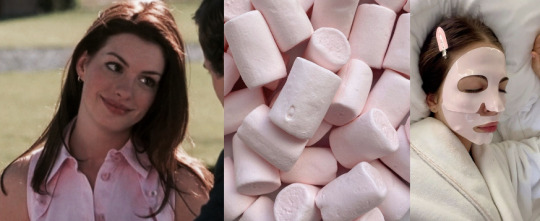
(none of these photos are mine)
“You cannot live your life to please others. The choice must be yours.” - Anne Hathaway
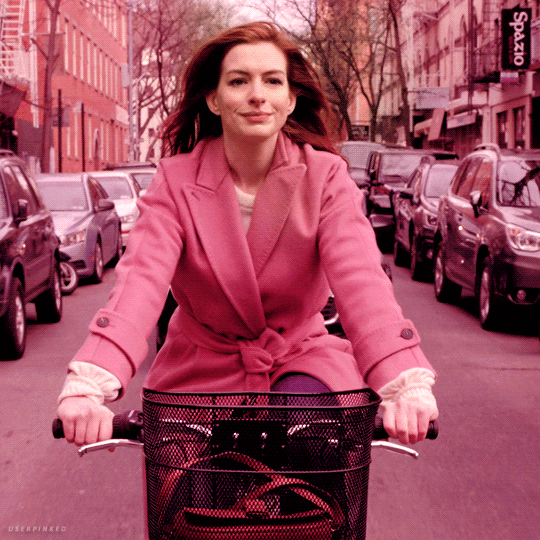
Stay busy!! Do you see those it girls like Serena Van Der Woodsen scrolling on their phone all day? No, you rarely do. It girls are always busy doing something. So, therefore do some self care, study, workout, read, journal, go shopping, go on solo dates, hang out with friends, paint, have a dance party, etc. Do fun activities and take care of yourself. Another example of a busy it girl is, Elle Woods. Elle Woods wasn’t becoming one with the couch everyday. She had goals to achieve. She had people that doubted her to prove wrong. So get up! Start planning out your day or week. Start making goals!!
Have goals! You wanna know why you’re bored all the time? Well, it’s because you have no goals. You practically don’t have a life because all you do is sleep, eat, scroll, and repeat. You’re wasting time doing nothing. You could’ve had a clean room by now. Maybe you could have finished that book. Whatever it is, you could have had it. You could’ve been 1% better than yesterday. You don’t though because you have no goals. That time you’re wasting, can be used toward your goals. It can be used toward your dream life. Maybe, you do have goals? Yet you don’t even take action. What are you waiting for? For someone to do the work for you? No, get up and start taking action.
Be mindful of what you consume online!! Just like how who you surround yourself with affects you. What you consume online affects how and who you are. For example, listening to sad music makes you feel sad. Music is meant to tell a story that you feel deeply. You may not even relate to the song, but you feel as if you do. So, you become sad and continue to listen to sad music. When listening to uplifting music you gain confidence. You still feel like you relate to the song. Just with a more positive effect. As for what you watch and read. Don’t read/watch stuff that will put you down. Watch/read content that will help you.
Complimenting yourself every time you pass the mirror!! Some may say it’s cringy, but DO IT. Would you rather be cringy or be the best version of yourself? Exactly, so either say it out loud or in your head. Say it even if you might not believe it. Say it because you deserve it! Try to be creative with your compliments. Not all compliments have to be about your looks. It could be your personality, your thoughtfulness, how creative you are, etc. Also loosen up, be your own hype girl. When you see the mirror you could say, “Omg I look like the main character.” “Oh wait, I am!” Lastly, don’t forget to have fun with hyping yourself up.
Mediating or journaling when stressed!! When stressed we start to feel a lot of tension. So, that’s why meditating is so important to do when stressed. All you have to do is sit down and focus on breathing. Plus, It calms down your nerves, relaxes the mind, body, and soul. Not just that, but plenty of other benefits. Which includes, helps focus, betters mood, helps you sleep, slows down aging, etc. As for journaling, it’s practically free therapy! That is, at least in my eyes. All you need is a notebook, a pen or pencil, and yourself. Journal what’s making you stressed or anxious. Let all your emotions out, write freely. Your words don’t have to make sense. Nor do you need to have perfect writing. In fact, when you journal it may be all over the place. However or whatever you write, just let it out.
Expressing your gratitude!! Life is so beautiful and has so much meaning. So, either write down what you’re grateful for or thank God. You are so blessed to be here today. That is only just one thing to be grateful for. There are so many things to be grateful for, air, family, friends, your mind, being born as you, water, books, food, shoes, clothes, and so much more!! Express your gratitude everyday. It could be the most random thing like, a poster. As long as you’re truly grateful, then express it.
7. Having a low screen time!! Cliché, I know but it’s true. Your devices are consuming you. Think about what you use your device(s) for. Good examples are, for work, for motivation, tips, workout videos, inspiration, knowledge, and maybe even faith reasons. Now here are bad examples, procrastinating, sinning, hating on others, scrolling, because you’re bored, to watching videos of people that make you insecure, and lastly to cope with something. Which to clarify, trying to cope by using your phone, I understand somewhat. On the other hand, it could make what you’re coping with worse. I say that because there are so many studies on why our phone is bad for us. Seriously, so many and we are completely unaware of the damage it does. So for that reason, try to use your phone only for the good. I know you’re probably going to make an excuse. Which we all do and that’s ok, but please try.
8. Encouraging yourself to do better!! You should always be working hard to be 1% better everyday. So on the days you don’t feel like doing anything, encourage yourself. Show up for yourself, you will be so happy after. Lastly, trust yourself to get whatever done!!
9. Having a healthy sleep schedule!! For me, I try to aim for 8-11 hours of sleep. For others, it may be 7-10 hours of sleep. Whatever makes you feel the most well-rested should work. Just try to be consistent and mindful of the time. I also recommend to be off your phone for at least 30-60 minutes before going to bed. It will improve how you sleep a lot. That also being said, try not to be on your phone when you wake up either. It’ll help improve your health by a lot. Especially, the health of your brain and eyes. As I had mentioned, try to be consistent. Set a certain time to go to bed and turn off your phone. Then, get your lovely beauty sleep gorgeous!!
10. CLEANING!! The last habit is, cleaning. Now, I don’t just meaning cleaning your room or house. I mean even your body and mind. For starters, a clean room equals a clean mind. Therefore, stop procrastinating and start cleaning. Turn on some fun music and maybe even romanticize cleaning. Just make it fun and DEEP clean. I know someone reading this has been procrastinating on cleaning. You know who you are, so clean everything. Then, for cleaning the mind a little extra meditate. I feel like I already went over a bit about meditation. So lastly, for the body, take your showers consistently. Also, please wear deodorant. I see way too many people nowadays not wearing deodorant. Seriously, wear your deodorant.
“Always walk around like you have on an invisible tiara on.” - Paris Hilton
Remember, always apply lip gloss and stay pretty! Love you, dolls 💋

Info I used: https://reallifecounseling.us/blog/benefits-of-meditation
My Pinterest: @arielleslipgloss
#glow up#that girl#wonyoungism#becoming that girl#clean girl#it girl energy#pink pilates princess#girl blogger#health is wealth#it girl#it girls#girly stuff#girly tumblr#girly girl#it girl tips#pinterest girl#girlblogging#girlblogger#girlblogger aesthetic#girlblogger interrupted#this is what makes us girls#girlhood#this is a girlblog#just girly things#lana del rey#anne hathaway#taylor swift#natalie portman#princess diaries#devil wears prada
308 notes
·
View notes
Note
said is NOT DEAD. our brains have seen it so much that when reading dialogue, it just glosses over it. if you don't want to detract from the dialogue, USE SAID. other words might ground the reader a little too much and lose a bit of immersion.
--this comes from my old tutor who now has a phd in literature
Said Is Not Dead
Of course not! "Said" should still be your go-to speech tag, the benefit being that it flows best. I find it nice to have a larger working vocabulary when it comes to expressing speech, though, and I think many writers would agree! It's one thing to use "said" because you know it's the best word choice and another to keep using it because you can think of no alternative.
Having said that:
". . . Don't tell me your character 'excaimed,' 'stated,' or 'replied.' When in doubt, just use 'said.' That's all. Maybe they 'answered.' They certainly did not 'retort.' You can use 'said' more often than you think . . . it's one of those words that takes a while before it starts sounding repetitive."
-- Ariel Gore, How to Become a Famous Writer Before You're Dead
"The best form of dialogue attribution is 'said,' as in 'he said, she said, Bill said, Monica said."
-- Stephen King, On Writing
"Mr. [Robert] Ludlum . . . hates the 'he said' locution and avoids it as much as possible. Characters in The Bourne Ultimatum seldom 'say' anything. Instead, they cry, interject, interrupt, muse, state, counter, conclude, mumble, whisper (Mr. Ludlum is great on whispers), intone, roar, exclaim, fume, explode, mutter. There is one especially unforgettable tautology: '"I repeat," repeated Alex.' The book may sell in the billions, but it's still junk."
-- Newgate Callender, in The New York Times Book Review
"Editors and critics often refer to melodramatic dialogue tags as 'said bookisms.' They know that these phrases give our story an amateurish look. Your readers might not know what the darn things are called, but chances are that they'll notice them, too . . . In most cases, the word 'said' would work just fine, and using said bookisms detracts from the dialogue."
-- Ann M. Marble, "'Stop Using Those Said Bookisms,' the Editor Shrieked."
"[Say is] just too simple and clear and straightforward for many people. Why say something when you can declare, assert, expostulate, whine, exclaim, groan, peal, breathe, cry, explain, or asseverate it? I'm all for variety and freshness of expression, but let's not go overboard."
-- Patricia T. O'Conner, Woe Is I
"In journalism circles, said is a virtue--simple, precise, and unadorned--and alternatives to it are considered frilly and silly. You don't have to agree, but be aware that lots of editors hold this view. Choose your alternatives to said with great care."
--June Casagrande, It Was the Best of Sentences, It Was the Worst of Sentences
"We're all in favor of choosing exactly the right verb for the action, but when you're writing speaker attributions the right verb is nearly always 'said.' The reason those well-intentioned attempts at variety don't work is that verbs other than 'said' tend to draw attention away from the dialogue."
--Renni Browne and Dave King, Self-Editing for Fiction Writers
Side Note: After a month-long hiatus while this uni writer struggled with exams, internships, interviews and multiple mental breakdowns, I am going to resume answering questions that have piled up in my inbox! Get ready to be bombarded with writing QnA!!!! :)
If you like my blog, buy me a coffee☕ and find me on instagram! 📸
#On Writing#writing#writers on tumblr#creative writing#let's write#poets and writers#writeblr#helping writers#creative writers#writers and poets#resources for writers#stephen king#on writers#said#writing a book#writing inspiration#writing ideas#writing community#writing advice#writing prompt#writer#writer stuff#writing quotes#writing questions#writing quiz#writers life#writers block#writers community#writerscommunity#inbox open
116 notes
·
View notes
Text
feb + mar + apr reads
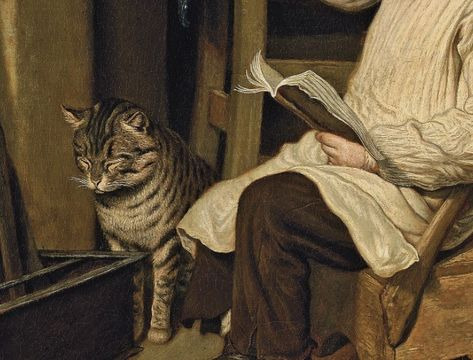

norma jean baker of troy by anne carson [★★★★★]
"Sometimes I think language should cover its own eyes when it speaks."
"Is she human? Are you? Is she a beast out of control? There's so much danger. No human can become just a beast, you plunge beyond - beyond what? Remember Jack the Ripper? 'I'm down on whores and I shan't quit ripping them till I get buckled,' Jack wrote in a letter to the newspaper, September 18, 1888. He never did get buckled. Of course insane, his mind blooming with it, who could go down that rabbit-hole or unlock such a puzzle as Jack? - but still, the woman! the thing is! the woman has everything and you smile and you take some."
: ̗̀➛ an exploration of the lives and myths of marilyn monroe and helen of troy.
: ̗̀➛ anne carson is there anything you can't do? please email me back. please.

piglet by lottie hazell [★★★★]
"'I want to make some food,' she said. 'For both of us?' he asked. 'No, just for me.'"
: ̗̀➛ one woman, piglet, and the lead up to her wedding in the face of a big confession from her fiancé.
: ̗̀➛ this one slipped beneath my skin and writhed around the spot inside me where i've tucked away all of my food issues.

merciless gods by christos tsiolkas [★★]
"I'm scared that if I let go, not only the room, not only this city, but the whole world will go cold forever."
"Your false gods cannot save you. There is only one God, my God."
: ̗̀➛ short stories that bash you over the head with how awful things and people and places can be. i did not live for this one... particularly wasn't into the one where a guy jerked his dad who has alzheimers off.

foe by iain reid [★★]
"All day. Time keeps moving. I've always thought that was a good thing. Until recently. I'm not so sure now. Is it good? For time to go by fast?"
: ̗̀➛ they want to send junior to space and replace him with a robot that looks and acts and talks exactly like him so his wife has company in his absence.
: ̗̀➛ marriage and trust and complacency, and a guy called terrence who we get reminded over and over has long gorgeous hair.
: ̗̀➛ a little boring for my taste. i had an idea of where it was going pretty early on, and it took a while for me to be proven right. pretty disconcerting!

acts of desperation by megan nolan [★★★★]
"The need was a true and human part of me, but I could feel nothing else of myself to be true or human, and so the need seemed ungodly, an aberration."
: ̗̀➛ a book full of confession, desire, jealousy, violence, and power. messy messy messy!!!! readers procceed with caution.
: ̗̀➛ shout out to everyone who said i should read this - you were right, it is up my alley.

gone girl by gillian flynn [★★★★]
"My wife was no longer my wife but a razor-wire knot daring me to unloop her, and I was not up to the job with my thick, numb, nervous fingers. Country fingers. Flyover fingers untrained in the intricate, dangerous work of solving Amy. When I'd hold up the bloody stumps, she'd sigh and turn to her secret mental notebook on which she tallied all my deficiencies, forever noting disappointments, frailties, shortcomings."
: ̗̀➛ i have become a gillian flynn STAN this year, it's true. despite having seen the movie multiple times, i enjoyed reading this, and was delighted to find some differences in the texts [for better and for worse].
: ̗̀➛ nick dunne, big fan of the lie of omission, mama's boy whose mama is dead, i'd like to introduce you to couples therapy.

dead beautiful and life eternal by yvonne woon [reread] [★★★]
: ̗̀➛ the first two books in a paranormal romance trilogy. these kinda bang guys, i can't lie. 15-year-old me was onto something when she decided to keep these instead of donating them. however, they DO have some of the worst book covers i've ever seen, sorry yvonne.

fourth wing by rebecca yarros [★★★]
: ̗̀➛ a romantasy book that has dragons, smut, and twists that you'll see coming from a mile away. pretty fun. recced to me by one man in person and a thousand women on tik tok.
: ̗̀➛ no one who has the thought 'double standards for the win' is using 'whomever' in a casual sentence with the guy she's having sex with.
: ̗̀➛ good enemies to lovers should have actual murder attempts. but maybe that's jusT MY OPINION.

my book rating system is as follows:
★ = i felt pure contempt the entire time
★★ = yeah it's a book
★★★ = i liked it!
★★★★ = good fucking book, damn
★★★★★ = blew my dick clean off and i'll throw a tantrum if everyone i know doesn't also read it and love it

84 notes
·
View notes
Text
“i can’t keep kissing strangers, pretending they’re you.” | Austin!Elvis x fem!reader
12 years ago, Elvis chose his career over you. What happens when he shows up at your door asking for a second chance?
a/n: this is entirely based on a dialogue prompt I saw from @twelvegods: “I can’t keep kissing strangers, pretending they’re you.” apparently it was a really good prompt because it inspired all 8,735 words of this lol. I I hope you all enjoy reading it as much as I loved writing it <3 Thank you all again so so so much for 500 followers!!
Word count: 8.7k
Warnings: a couple swear words, lots of angst in the first half, Y/N has trust issues oops, I think that's it? As always, please let me know if I missed anything!
Please like/rb if you enjoyed! 🤍

“I’m gonna marry you someday.”
That’s what Elvis Presley had said to you when he was just 20 years old and his career was starting to take off, thanks in large part (as Elvis said) to the Colonel. And you, being the young girl in love that you were, believed him.
What a fool you were.
You managed to stay together for another year before the Colonel, his claws digging into Elvis’s heart and soul to bleed all the green he could out of him, managed to convince him that appearing single would be what was best for his career— he had to let all those screaming girls believe they had a chance with him, after all.
“Baby please,” Elvis pleaded, “this is for my career. I promise it won’t be for long. We’ll get back together, you’ll see.”
You shook your head, “No, Elvis. I’m not gonna sit around waiting for you like some damsel in distress. If you want me, keep me. But otherwise…”
You paused, waiting for him to say something. Begging, pleading, praying he would say something, that you had managed to change his mind.
When he said nothing, you exploded.
You had screamed and cried, and he had screamed and cried, and you had taken your things that had made their way into his room in Graceland and stormed out of his life for good, only pausing to give him one final sincere “I love you” before you walked out the door.
The last image you had of him (that wasn’t on a tv screen or poster) was of him standing in the foyer in Graceland, tears streaming down his face, refusing to chase after you.
You hoped that time would eventually heal your wounded heart, but apparently whoever said time heals all wounds was a fucking idiot because it was now just over a decade later and you were still as in love with Elvis Presley as you had been when you were one of the only girls in the world who knew his name.
He, evidently, didn’t feel the same.
That much was clear, at least, based on the way he was still overly flirtatious with his audience in his shows, not to mention the rumors about relationships with his movie co-stars. In his shows, before he went off to Germany, he had taken to stepping down into the audience and kissing practically every woman in the room. That alone cleared any remaining doubts from your mind that he still thought about you in any capacity, despite that little voice in the back of your head that still held out some futile, desperate hope.
You’re about to curl up on the couch with some tea and your copy of Anne of Green Gables — exactly what you need on a rainy day like today — when someone knocks on your door.
“You expecting anyone, Y/N?” your friend Annie calls from the hall. You had been living with her for about 5 years down in Louisiana, after the memories in Memphis had become too much, and you loved it.
“Nope,” You call back, wondering who on earth would be knocking on doors in this weather. “If it’s one of those door-to-door salesmen, slam it in his face again.” You suggest with a laugh.
“Will do,” comes her reply, and you can hear the smile in her voice.
You turn you attention back to your book as the door opens, and nearly spill your tea all over yourself as you hear a sultry drawl you hadn’t heard in person in over a decade.
“Hi Annie… is Y/N here?”
There’s a moment of silence where you’re sure Annie is as stunned as you are, then:
“Maybe,” she replies curtly, “What do ya want?”
Annie knew the whole story of you and Elvis, and she had sworn that she’d never let you get hurt like that ever again.
“Please, Annie, I just wanna talk to her.”
“And why should I let you? You’ve got a lotta nerve comin’ here after what you did—“
You’re not sure what prompts you to set your book and mug down and sigh “Annie, just let him in,” but you’re just as surprised as Annie is that you did.
She reluctantly steps aside to let him in, eyeing him warily the entire time.
Your eyes drink him in; this is the first time you’re seeing him in person in over 12 years, and your mind automatically catalogs the differences since you last saw him. He’s tanned, with a few more freckles, a result of the California sun, no doubt, and tinted glasses hide his eyes. His burgundy suit is soaked, and his hair, which was no doubt carefully styled before, now flops onto his forehead, dripping into his eyes.
He takes off his sunglasses, revealing tired blue eyes. From the way his eyes track along your body, he was drinking you in the same way you had done him.
There’s a beat of silence, then his eyes finally meet yours.
“Hi,” he says softly.
You maintain a straight face, unwilling to be taken in so easily.
“What do you want?” you ask, your voice cold. You want nothing more than to rush into his arms, but you remind yourself: he chose his career over you, and never looked back.
“I fired the Colonel,” he blurts, after several moments of trying to figure out what to say.
“About time,” you snort, dropping your serious demeanor for a split second, “but what does that have to do with me?”
“I made a mistake, Y/N. A lotta mistakes, really, but letting you go was the biggest one I ever made in my life. I missed you so, so much, and I—“
You cut him off, “Elvis, cut the shit. You made it very clear you moved on from me.”
“Y/N, I never stopped thinkin’ about you, I promise.”
“Sure, and was that before or after you kissed every girl in the audience at the end of every damn show?”
“Y/N, I—“ he starts, frustrated, then takes a deep breath. He starts again, calmer, softer, “I know how that looks. But I… I can’t keep kissing strangers, pretending they’re you.” He looks earnestly into your eyes.
You feel your cracked heart melt just a little at his words, and yet…
“I don’t…” you sigh, “I don’t believe you. You put your career before me over a decade ago, and I tried to move on, but I couldn’t when I was seeing your face and hearing your voice everywhere, and it hurt like hell. And now you walk back in here, tell me you just made a mistake, and… what? Expect me to take you back just like that?”
“Please, Y/N,” he says, an echo of his plea back when he broke your heart for the first time, “I know I messed up bad, but… it’s you. It’s always been you, with those girls in the audience, even with Ann-Margret… I was always thinkin’ about you. And I’m willin’ to do whatever I have to to fix this. Anything. I mean it.”
And you can see the conviction in his eyes, like he’s that little boy again who believed he was Captain Marvel Jr. and could fly his family out of poverty to the Rock of Eternity. You know in your bones that he’d buy you the moon if it meant he could love you again.
But you’d made the mistake of believing his promises before.
“Elvis, I don’t know if I can trust you. How do I know you won’t drop me when your next manager thinks that’d be ‘what’s best for your career’?”
He winces as you throw the Colonel’s words from all those years ago back in his face. “I know I ruined any kind of trust you had in me that day, and I can’t tell you enough how goddamn sorry I am, Y/N. But I’m not askin’ for you to forgive me right now, I just want a chance to try and fix this. That’s all, I swear.”
He waits as you process his words, practically holding his breath as you think of how to reply.
“I’ll think about it,” you say softly.
He nods. “That’s all I’m askin’ for, sw— Y/N,” he fumbles to avoid using the old pet name for you.
“I think you should go now,” you say, your voice cold again to hide how the almost-pet name brought a storm of feelings rushing back..
“Right, um..” he fumbles around in his pocket, producing a scrap of paper with a phone number scrawled on it, “Gimme a call, if you want? I’ve gotta head back to Memphis in a couple days, that’ll probably be the easiest way to reach me if you, uh, decide anything.”
“Okay,” you nod, glancing at it quickly before stuffing it in your pocket. The number was for Graceland’s house phone; a number you’d never forgotten for a second, not that you’d be telling Elvis that.
“Well, um… bye Y/N, Annie,” he nods as he moves past your roommate towards the door. He pauses, hesitating for a moment before turning back to you. “You look good, Y/N,” he says softly before heading back out into the downpour.
The “you, too” you whisper in reply is lost in the sound of rain hitting the pavement outside.
The enormity of everything that had just transpired suddenly hits you and you fall back onto the couch, tears welling up in your eyes.
Annie rushes over, concerned. You look up as she fusses over you.
“Was that… did that actually just happen?”
Annie nods, “Yeah, it did, honey. I can scarcely believe it myself.”
“Did I do the right thing?” You wring your hands, suddenly second-guessing every decision you made during the interaction with Elvis.
“I know I’ve always said that I’d punch him in his smug face if he ever showed up here after what he did to you,” Annie says, “But I see the way you look at him when he shows up on the TV, and that ain’t the look of someone who’s just angry at an ex. You’re still in love with him, honey, I know it, and I feel like a fresh start is what both of you need. I don’t mean to overstep,” she drawls, “But if I can give you some advice: just start over as friends. Don’t jump back into a relationship right away. Try to make it organic. A clean slate.”
“A clean slate,” you echo, processing her words.
You mull over what to do for a few days, worst and best-case scenarios swirling around your brain, and eventually dial Graceland. Your foot taps anxiously as you lean against the wall by the phone, listening to it ring.
“Hullo?” A raspy voice comes over the receiver.
“Hi, Elvis,” you say, trying your best to sound casual, “It’s, uh, it’s Y/N.”
“Oh, hey,” he stammers, sounding less like the confident King of Rock and Roll superstar and more like the shy little kid you’d grown up with, “Uh, how are you?”
“I’m alright.” You reply, “Look, I did some thinking about what you said and, well… I’ve got a couple questions before I decide anything.”
“Sure, yeah, what is it?”
“Well, first of all… why now?”
“Huh?”
You sigh, “It’s been over 10 years, Elvis. What made you come back now? What made you fire the Colonel after all this time?”
“Well, to be perfectly honest, I wasn’t very happy with the movies the Colonel was signing me up for. And then he planned this whole silly special for NBC…” he sighs, “I’ve been lost ever since I lost Mama— before that, even, when I lost—“ he cuts himself off with an awkward cough, “uh, anyway; he wasn’t helping. And I finally realized that he didn’t really care what I wanted to do. It was all about profit for him,” he says quietly. He goes on to explain hiring Binder and Bones to help with the special, to “find himself” again, and the realization he’d had that he hadn’t truly felt like himself since he’d left you.
“Hm,” is your only response at first, trying to shove down the warmth growing in your chest. “Well, um… thank you for telling me.”
“You’re welcome. I want you to know, Y/N… you can trust me. I know I ruined that back then, but I’d really like a chance to try and rebuild it with you if I can.”
“I think I’d like that, too.” You say after a moment of silence. “Look, Elvis, I… I don’t think it would be a good idea, if we’re gonna do this, to pick up right where we left off. We need a… a clean slate. So what if we started over as friends?” You fidget with the phone cord as you await his reply.
There are several moments of silence, and you're wondering if something happened with the call before his raspy drawl comes over the phone once more.
“I’d love to be your friend again, Y/N.”
A wave of relief floods your body, and you smile. You think for a moment before speaking again, saying hesitantly, “I’m coming up to visit for Mama’s birthday next weekend, and… maybe we could see each other then? That would be a ‘friend’ thing to do, right?”
“Yeah, I’d… I’d really like that.”
“Great, well,” you worry your bottom lip between your teeth, “I’ll just give you a call when I’m back home and we can figure everything out then?”
“Whatever works for you is fine with me,” he assures you, “I’m lookin’ forward to it.”
“Me, too,” you say softly, allowing a tiny bit of the warmth you felt earlier to creep back. “I’ll see you next weekend, then.”
“See you then,” he says and with a click, the phone is back to humming a dial tone.
You’re buzzing with anticipation for the next week, not only excited to see your family but also to see Elvis.
“Y/N!” Your mother rushes out as you pull into the driveway of your family’s Memphis home, “My baby’s home!”
“Happy birthday, Mama,” you smile as she rushes up to give you a hug, squeezing you tight.
“Thank you, darlin’. Come inside, honey, come in!” she insists, grabbing your suitcase from you despite your protests.
“Honey!” she calls to your father as she leads you into your childhood home, “Look who’s finally decided to come for a visit!”
“Mama, I was just here for Easter,” you remind her as you head to the living room to greet your father. “Hi Daddy,” you smile as he pulls you in for a hug.
“Good to see you, sweetheart,” he says, “Louisiana treatin’ you well?”
You nod, “Mhm. Everyone’s real nice, and Annie’s always lookin’ out for me.”
You fill your parents in on life in Louisiana, and in return they (your mother, mostly) regale you with all the Memphis gossip you’ve missed. Apparently the young couple next door had a baby recently, another young couple in town just got married, and oh yes, Elvis came back fr—
“Mary Ann, you know I don’t like talkin’ about that boy!” your father exclaims, cutting your mother off.
“Well, I don’t know what you want me to do, Walter,” your mother retorts, “It’s not as if we can pretend he doesn’t exist, not when he’s such a big part of this town…”
As you listen to your parents bicker, you decide that now might as well be as good a time as any to bring up your new friendship.
“Actually, Mama,” you interrupt their bickering, “I’m gonna try and meet up with Elvis while I’m in town this weekend…”
Your father’s expression flickers between confusion and anger at your words, while your mother’s morphs into one of delight.
“Oh honey, that’s wonderful!” She exclaims, “Though I admit, I thought you’d’ve at least called to tell us you got back together—“
“Mama!” You cut her off, heat flooding your face, “We’re not back together, I promise,” you add with a glance over to your father. “He showed up at our place last week, we had a talk, and we’re gonna try to be friends again.”
“Well I’m glad to see the two of you are startin’ over, honey,” your mother says with a smile
“I still don’t trust that boy,” your father grumbles. “Just… be careful, alright?”
You nod, “Of course, you know I always am, Daddy.”
”When were you two planning on meeting up?” your mother asks.
You shrug, “We haven’t figured out the details yet. I was gonna call him today to sort everything out.”
”Well you should invite him over for dinner while you’re in town.” your mother suggests, with just a hint of a mischievous sparkle in her eye, ignoring your father’s clear alarm at the suggestion.
You groan. “Mama, no, he really doesn’t need to come for dinner—“
”Y/N L/N, inviting a friend over for dinner is a polite thing to do,” your mother scolds, “and in this house we are always…?”
“Polite and respectful,” you mumble, repeating the words that had been drilled into you in childhood.
She nods, satisfied. ”It’s settled then. You two will have your little meetup and then he can come over for dinner that night, or the next if it suits him.”
”Yes, Mama,” you say, resigned. ���I’ll go call him now.”
You make your way over to the kitchen, dialing the number you’ve had memorized for over 12 years.
“Hello?” The same raspy voice comes over the receiver.
”Hey, it’s um, it’s me. Y/N.”
”Oh, hey. Um, how are ya?”
”I’m alright. I’m back in town now, and Mama’s bein’… well, Mama, so you can imagine.” you say with a soft laugh.
”Oh, I can imagine,” he agrees, and you can hear the smile in his voice. “How was the drive up?”
The two of you make small talk for a bit, slowly easing back into being a part of each other’s lives, and eventually you remember the reason you called. “Oh, yeah, by the way; I was calling to see if there was a day or time that worked for you as far as meeting up this weekend?”
”Oh, yeah.” You can hear some rustling on his end, and you assume he’s checking his schedule. “I’m actually free this afternoon around 1 if that works? Or tomorrow?”
You weren’t prepared to see him quite so soon, but you suppose now is better than putting it off until tomorrow. “This afternoon is perfect. You still like that diner on Beale Street, right?”
He hums an affirmative, and you smile, “Great, I’ll meet you there at 1, then.”
”I’ll see you then,” and the line clicks back to a dial tone.
You head back to the living room, entering to see your parents doing a wonderfully poor job of pretending as though they weren’t listening to your conversation. You roll your eyes.
”I assume you already heard, but Elvis and I are meeting for lunch at 1, just as friends, Mama,” you say pointedly, noting the beam on your mother’s face. “I’ll ask him about dinner then.”
Your father harrumphs, but mainly keeps silent, a firm frown on his face.
”That’s wonderful, honey,” your mother beams, “You’ve gotta get goin’ pretty soon then, huh?”
“Huh?” You glance over at the clock on the mantle and sure enough, it’s already 15 past noon and you still haven’t changed out of the outfit you wore for the 6-hour drive up to Memphis. You grab your suitcase and race to make yourself presentable, managing to change into a dress that seems nice enough for a lunch outing (but not too fancy), fix your windswept hair, and reapply your makeup in a cool 30 minutes before racing out the door.
Before you can make it out to the porch, though, your father stops you, calling your name as you’re about to step out the door. You turn, “Yes, Daddy?”
He has a solemn look on his face. “Just… be careful, darlin’. You know me, I hold grudges like no one else, and I admit I still haven’t forgiven him for what he did to you all those years ago. If you let him in, and he hurts you again somehow I… I don’t know what I’d do.”
You step back into the room and envelop him in a hug. “Thank you for looking out for me, Daddy. I’ll be careful, I promise. I’m not the same girl I was when I met him.” You add with a sad smile.
He squeezes your hand comfortingly, “I know you’ll be smart. If he does anything, you come right to me and I’ll sort him out, alright?” You nod and, satisfied, he kindly shoos you out the door with a soft “Go on, have fun.”
You pull up to the diner to find that Elvis is already there, if the deep purple Cadillac parked nearby is any indication.
He waves from a booth near the back as you enter, his bodyguards seated at a table nearby. You slide into the seat across from him, pushing down the butterflies that threaten to stir. It might’ve been a bad idea to choose the place you went on your first date, you realize belatedly, but too late now.
“How are you?” he asks with a casual smile.
“Pretty good,” you reply, “My parents have been updating me on all the Memphis gossip I’ve missed since I was away, very exciting stuff,” you say sarcastically. “Mama says hi, by the way.”
“Tell her I say hi back,” he grins.
“Will do. Uh, how are you?” You say, trying to fall back into the rhythm of talking to him.
“I’m alright. There’s this big thing I’m gonna be workin’ on soon, I’m pretty excited for it.”
“Oh, big thing?” You ask, your interest piqued.
“It’s a…” he pauses, looking around, “no one really knows about it yet, so you gotta promise not to tell anyone, alright?”
You nod, and he continues, leaning in to whisper, “You remember that special I told you about, the one that Steve and Bones are helpin’ me with? It’s gonna be a TV special for NBC. A Christmas show, kinda.”
“Kinda?”
“Well, it’ll have a couple of Christmas songs, but I really want it to be about finding myself again. Gettin’ back to the real Elvis.”
“Sounds exciting,” you reply, a genuine smile coming across your face at how excited he seems.
A starstruck waitress comes to take your order, and the conversation continues.
“So,” Elvis says, “how are you doin’ in Louisiana?”
“I actually really like it there,” you reply, smiling. “Annie’s great, obviously, and I found a job at a bookstore that I really love, things are goin’ pretty well. I do have the occasional grumpy customer, but that’s just how it is.” You finish with a shrug.
“Grumpy customer? Sounds like you’ve got some stories to tell,” he says, sounding genuinely interested, and you can’t help but launch into the story of a man who was sure that Stranger in a Strange Land was in the nonfiction section no matter how many times you tried to lead him over to science fiction.
You finally fall back into a rhythm of friendly conversation, trading stories for over an hour before you finally bring up what your mother had asked.
“Oh by the way,” you say, sipping your milkshake, “Mama wanted me to invite you to dinner tomorrow night.”
Elvis nearly chokes on the fry he’s just taken a bite of. “Sorry, what?”
“I told my parents that we were meeting up and she was adamant that I at the very least invite you to come over for dinner tomorrow— you know how she is about politeness—“ you explain, “but I promise, you don’t have to come if you don’t want to. I completely understand, I’d be more than happy to make up an excuse for you.”
“And refuse an invitation from Mrs. L/N? It’s like you want her to kill me,” he jokes. “I’d be more than happy to come,” he says, in a more sincere tone. “Besides, friends come over for dinner right?”
“Of course,” you say, trying to reassure yourself as much as him, “and Mama’s very excited to see you, so be prepared for that.”
“I always am,” he replies with a smile.
You arrange for him to come over at 7 the next night, and the rest of lunch goes smoothly until the check arrives, which starts off a round of bickering between the two of you about who should pay.
“Please let me get this, I want this to be a start to making it up to you,” Elvis argues.
“I appreciate it but I’m perfectly capable of paying for lunch, thank you very much,” you retort, and this goes on for several minutes before the two of you eventually agree to split the check.
“It was good to see you, Y/N,” Elvis says as you exit the diner, his bodyguards dutifully on alert as they follow you out.
“You, too.” You say. “I…” I didn’t realize just how much I missed you, is what you want to say, but instead, you go with “I had a good time.”
His face lights up as if those 5 little words were all he needed to brighten his day. He steps towards the Cadillac, throwing a friendly wave to you as he calls “See you tomorrow!”
You wave back, and you don’t realize how happy you are until your cheeks start to ache from smiling on the drive home.
The next day, your mother is practically frantic, bustling around the house making sure everything is perfect for when Elvis gets here.
“Mama, it’s not like it’s the first time he’s ever been here! And we’re just friends, please try to remember that.”
“Alright, alright, I know, honey. I just think it’s nice that you two are spending time together again, that’s—“
The doorbell rings, and your mother jumps into action, plucking microscopic bits of lint from your dress before hurrying to the door and opening it with a polite smile.
Elvis stands on your porch, bearing a polite smile and a bouquet of lilacs. “Hello, Mrs. L/N.”
“Hello, Elvis!” Your mother beams, “It’s wonderful to see you again. And you brought Y/N flowers, how sweet!” She looks pointedly at you.
Elvis lets out a nervous laugh as he steps into the house, “Actually, Mrs. L/N, these are for you. A birthday gift.” He holds out the bouquet to her with a shy smile, looking remarkably like the shy boy he had been back in ‘51 when you first became friends.
“That’s very kind of you, thank you dear. Wasn’t that kind of him, Walter?”
“Very kind,” your father grumbles in a tone that makes it seem as though Elvis had brought a pile of mud as a gift. He nods a greeting, “Hello, Elvis. California’s treatin’ you well, I hear.”
“Uh, yes, sir, it is. Thank you.” he replies.
When your father doesn’t respond, Elvis turns his attention to you. “Hi, Y/N.”
“Hi,” you reply, resisting the urge to fuss with your dress.
The awkward silence that follows is broken as your mother ushers everyone to the dining room, arranged so she and your father are at the heads of the table while you and Elvis are sitting across from one another.
The meal begins, and the conversation that follows is strained but polite, with your mother eagerly asking questions about life in California and Hollywood and Elvis answering modestly then turning the conversation back to your family, remaining the picture of a Southern gentleman. The conversation remains polite apart from your father’s not-so-subtle grumbling about Elvis running off the California, and just when you think it can’t get any worse, he decides to bring up the rumors of Elvis’s womanizing.
“So, Elvis,” your father says casually, though his eyes remain calculating, “what’s all this I hear about you and… what’s that actress’s name, Ann-Margret? Or have you moved on to someone new by now?”
You feel your face flush, and you’re sure the mortification shows on your face as you hiss for your father to stop, please.
“Oh well sir, that’s really all just the tabloids tryin’ to get their stuff to sell, there’s no truth to that at all, I promise. Ann-Margret is a good friend of mine now, though.” Elvis answers politely, unfazed as your mother quietly scolds your father.
“Walter, quit it, you’re scarin’ the boy!”
“Well good, he should be scared after what he did to my little girl!”
“Dad!” you exclaim, mortified, “We talked about this! We’re friends now, you promised you’d be polite!”
“No, it’s alright, Y/N,” Elvis assures you, briefly breaking eye contact with your father to glance over at you, “He’s just lookin’ out for you like any father would, and I respect you for that, sir.”
Your father grunts a reply, and the conversation picks up again, still polite but even more strained than before.
Elvis remains as polite as ever, even offering to take care of the dishes — “Oh I can get those plates for ya, don’t you worry Mrs. L/N” — and despite your determination for a clean slate, your mind betrays you, reminding you of how shy and overly polite he was the first few times he was over for dinner, especially after the two of you first got together. Sure, he’s gotten a little more confident, which you’ll admit is kind of attractive, but— NO.
You firmly cut off that train of thought, no matter how badly that little voice in the back of your head (the one that practically melted at the sight of him at your door with a bouquet, reminiscent of your first date) wants to keep on track. Just friends, clean slate, you remind yourself.
After the dishes are done, your mother prepares coffee for everyone and the four of you head to the living room. At one point, Elvis gets up to get a refill, and your father follows him.
Your father approaches Elvis once it’s clear that neither you nor your mother will be getting up, and corners him.
“Now Elvis, I’m gonna try to be polite, because my daughter’s told me you two are tryin’ to be friends and I respect her wishes, but I don’t trust you after what you did to her. And if I get even a hint that you’re playin’ with her feelings, well… I’m afraid that won’t end well for ya, son.”
Elvis nods quickly, “Sir I promise you, I have no intentions of playing with your daughter’s feelings. She’s very dear to me, and I swear I’d do anything to make sure she’s happy.” He says, conviction clear in his eyes.
Your father eyes Elvis for several long moments and, apparently satisfied, returns to the living room with more coffee for you and your mother.
Elvis takes a breath to compose himself — he’s forgotten how scary your father could be when he wanted to — and exits the kitchen, re-entering as you’re laughing at some comment your mother made.
You turn as he enters with a wide smile on your face, and he’s suddenly slammed back to a time where you looked at him like that every time he entered a room— when you looked at him as though he’d hung the moon and stars just for you.
Fighting the urge to rush over and kiss you senseless — that’s not something a friend would do, he reminds himself — he moves to sit in the armchair across from you, turning his attention to whatever neighbor your mother is gossiping about tonight.
The night eventually winds to a close and Elvis thanks your parents profusely for “a wonderful meal and even better company.”
Your mother waves off the compliment modestly, “Oh it was nothin’ darling. We’ll be glad to have you back anytime. Y/N, why don’t you walk our guest out while we take care of these last few things?” she says, gesturing to the coffee mugs still sitting out.
Elvis gives one last wave to your parents, wishing them well, before stepping out to the porch with you.
“Well, my parents loved you,” you tease as the two of you make your way to the pink Cadillac looking more than slightly out of place in your modest gravel driveway.
He lets out a shy laugh, “They haven’t changed a bit, that’s for sure. Your daddy’s still as protective as ever.” His tone softens as he continues, “It was nice seein’ them again. ‘Specially your mama. She’s always been better to me than I deserve.”
Acting on impulse, you lean over and squeeze his hand as you remember his own mama isn’t waiting for him at home anymore. “You’re welcome over anytime. I mean it.”
“Thank you,” he replies in a near whisper. Your hand stays clasped with his, the warmth of him tempting you closer, and his gaze drifts slowly down to your lips before the two of you snap back to yourselves and create a respectable two feet of distance between you.
“Uh, anyway,” you attempt to continue the conversation, refusing to acknowledge that moment of… whatever that was, “Are you gonna be here for a while longer?”
He shakes his head, “I’m actually gonna be leaving for California again tomorrow.” he says almost apologetically, adding with a nod to the house, “But I’ll still be able to call ya for a bit, right?”
A frown crosses your face as you remember: “I’m actually headin’ back to Louisiana tomorrow. But,” you brighten, “I can give you my number for down there if you want?”
“I’d love that,” Elvis smiles.
You rummage around in your pockets for anything you can scribble on, producing some long-forgotten shopping list and a small pen. You scrawl your phone number down and hand it to him, determinedly not noticing the sparks you feel as your fingers brush.
“I’ll call ya every night,” he says as he stuffs it in his pocket, “I’ll need ya to keep me updated on all the Louisiana gossip, hm?”
A sad smile crosses your face at the memory of the last time he’d made a promise like that. Despite all your talk of a clean slate, you can’t help but remind him, “Let’s not make promises you can’t keep, Elvis.”
You give him one last wave, wish him goodnight, and walk back inside, his pleas of “What? No, Y/N, this ain’t gonna be like that!” falling on deaf ears.
You put on a brave face for your parents the next day, joking about what a coincidence it was that both you and Elvis happened to be leaving town on the same day, but behind closed doors, you’re unable to block the memories of the last time he had promised he’d call you every night: when he went along with the Colonel on Hank Snow’s tour.
1955
“I’ll be back in time for prom, darlin’, I promise,” Elvis reassures you over the phone. “I’ll bring you a corsage, we’ll have a great time.”
“Okay,” you reply, “I’m sorry, I know I must sound silly, but I’m just really lookin’ forward to going with you.”
“That’s not silly,” he assures you with a soft laugh, “I’m lookin’ forward to it, t—“ he cuts off, and you can barely make out what sounds like a knock on the door on his end of the line. “That’ll be Scotty again, no doubt.” he groans good-naturedly. There’s some shuffling as he makes his way over, yanking the door open with a “Scotty, how many times do I have to tell ya—“
“Elvis?” you say, concerned at how he cuts off mid-sentence, “Is everything alright?”
There’s a moment of silence, after which he stammers out a response.
“I, uh… I gotta go, I’ll call ya back, darlin’, alright?”
He doesn’t bother to wait for an answer before hanging up, but in the split second before it goes to a dial tone you can just make out a woman’s sultry voice over the receiver.
1968 - Present Day
He had still called after that, but not as frequently; certainly not every day like he promised. And while you forgave what happened on tour, you had never quite forgotten what him being away for a stretch of time could mean.
Still. Clean slate. Maybe this time could be different, you reasoned, though you were barely convincing yourself at this point.
You head back to Louisiana, promising your parents you’ll visit again soon and that you’ll give them a call as soon as you get home. You stumble through the door of your little house, exhausted after the 6-hour drive. Annie rushes over to hug you.
“Hey honey! Good to have ya home,” she grins, taking your suitcase from you, “I’ve got lunch for ya, you go sit down. I’ll put this in your room. And then I wanna hear all about how that li’l meetup went,” she adds with a wink, gently shoving you towards the kitchen while she heads down the hall.
You smile as you enter the kitchen to see a little card with the words “Welcome Home” in Annie’s signature scrawl next to a plate on the counter. You take a bite of the sandwich waiting for you — grilled cheese, Annie’s specialty — and finally allow yourself to relax. At that moment, Annie slides in with a mischievous grin, plopping herself down on the stool next to you.
“So…” she leads, a sparkle in her eye. “How was it?”
“It was good,” you reply, purposefully misinterpreting her question, “We took Mama out for dinner and I made her a cake—”
Annie cuts you off with a playful swat to your arm, “Not that! Elvis,” she says, dragging out the ‘s’ longer than necessary.
You roll your eyes, “Fine! It was… fine. We met up for lunch at this old diner we used to go to, we talked… Mama had me invite him over for dinner, and he brought flowers for her” you say pointedly, noticing the gleam in her eyes. “It went well, all things considered. Daddy did have some things to say, he still hasn’t quite forgiven him for what he did, but Elvis was a real gentleman the whole time. He actually went back to California today, filming somethin’ for TV, but he said he wants to keep in touch.”
“That’s great, honey!” Annie squeals, “I’m glad y’all are doin’ well.”
You give a weak smile in return. “Yeah, he said he’s gonna call every day, but…”
“Oh…” Annie’s eyes soften in understanding, recalling what you had told her about your relationship before. “Y/N, I know it might be scary, but what if it’s different this time? What if he actually keeps his promise? He’s said he wants to work on trust with you again, right? This is the perfect opportunity for him to prove to you that he’s worth trusting. And if he doesn’t,” she adds in a lighter tone, “I’ll fly out to California and sock him right in his pretty face myself.”
“I know you will,” you laugh, “but you’re right, I’ll—“
You’re cut off as the phone rings, and you lock eyes with Annie. It can’t be him already, can it? No, it’s probably your parents calling to make sure you made it home safely, you reason as you move to answer it.
“Hello?”
“Hey, Y/N,” the heavy drawl surprises you, and you nearly miss what Elvis says next, “I’m glad I caught you, I was callin’ a bit ago and got quite a tellin’ off from Annie sayin’ that you weren’t there yet.”
At that you turn to glare at Annie, who only gives you a smug, mischievous smirk in return.
“Yeah, I just got in maybe twenty minutes ago,” you reply, the shock slowly fading into a kind of warmth as his voice washes over you.
“How was the drive?”
“Long,” you say with a laugh, “I’m glad to be home now. How’s California?”
“‘S alright,” he replies, “I just got back from finalizing some stuff with Steve for filming tomorrow.”
“Oh yeah,” you recall your conversation from a few days ago, “The Christmas special, right? Or,” you correct yourself, “the not-entirely-Christmas special.”
“Exactly,” he laughs, “I’m actually pretty excited about it.”
“That’s good,” you smile, “I hope everything goes well.”
“Thank you, Y/N,” he says sincerely. “But anyway, enough about me. How are you?”
“Well, Annie had one of her famous grilled cheeses waiting for me when I got here so I’d say we’re off to a pretty good start. Tomorrow’s an inventory day at work, though, not nearly as exciting as filming a special for NBC.”
He sucks in a breath in sympathy, “I remember you never liked those days. Good luck with that,” he says, “and I’ll tell ya what: I’ll make sure to tell you all about the boring parts of filming so ya don’t get too jealous, how ‘bout that?” he teases
“Sounds perfect,” you laugh.
You don’t even notice the time flying by as the conversation continues, the two of you talking about everything and nothing, and you fall into a rhythm of talking for hours every night. Slowly, the nagging fear you feel that today’s the day he won’t call starts to fade, and you look forward to your nightly chats where you fill him in on any interesting customers and he tells you about the goofs he made that day during filming.
“I’m not kiddin’, I legitimately forgot the words!” he laughs.
Your only reply is to laugh even harder at the image of him surrounded by cameras forgetting the words to Heartbreak Hotel.
“Alright, come on, it ain’t that funny,” he says in a mock-hurt tone.
“Oh, I promise it is,” you say, wiping a tear from the corner of your eye, “I might need you to send me a copy or whatever of these goofs, I haven’t laughed this hard in ages.”
“I’ll see if I can arrange that for ya…” he replies, his voice trailing off as he seemingly turns away from the receiver for some reason.
“Is everything okay?”
“Yeah, just someone at the door,” he assures you, “Gimme one second.”
There’s some shuffling as he makes his way to the door, and your surprise at the thought of him carrying the phone with him across the room turns into a sinking feeling in your stomach as you hear the squeak of a door open and the muffled sounds of a woman’s voice. Your heart sinks as the memory of that day on his tour starts to play again in your mind, a cacophony of not again, I knew this would happen, I shouldn’t have trusted him filling your ears.
“-N? Y/N, you there?” You slowly blink back to reality as Elvis calls your name over the receiver, “Everything alright?”
“Y-yeah,” you reply hesitantly as he dives into an explanation about some crazy fan sneaking past security to his room. He pauses, picking up on the uncertainty in your voice.
“Y/N… you can talk to me, you know that, right? What’s wrong?” he says softly, and he sounds so genuine you want to cry.
“It’s… it’s silly…” you reply, embarrassed at the thought of telling him that that memory from all this years ago still haunts you.
“You don’t have to tell me, but I’d really like to know if I can help,” he replies patiently.
You sigh, and launch into an explanation of that night back in ‘55. “You just hung up on me, and the last thing I heard was some woman’s voice, and I didn’t realize how much that hurt me until I started worrying about who you were with whenever you were gone for a long time.” You explain softly, nervously fiddling with the phone cord.
“So just now, when you heard that girl at my door…” he sighs, realization dawning on him, “that brought all that back, didn’t it? I’m sorry, Y/N.” He says, and the sincerity of his words does bring tears to your eyes this time.
“I’m alright, I promise,” you reassure him, “surprised you turned her down,” you tease, wanting to move on.
“I don’t do that kinda thing anymore,” he laughs, picking up on your attempt to move to another topic, “besides, why would I stop to talk to some stranger who thinks they know everything about me when I could talk to you?”
Your heart flutters at the compliment, and you hope he can’t tell how much you’re blushing over the phone, “Aw, you’re sweet.”
There’s a moment of silence; not an awkward one, but comfortable, like the two of you don’t need to talk to enjoy each other’s company, even if it’s just on the phone. The moment is cut short, however, as Elvis speaks up again.
“I was thinkin’— and you’re free to say no, of course— well, Steve’s organizing this screening of the special before it airs. Right now it’s just Steve, Bones, Dad, Jerry, and me, but I’d like you to be there, too. Maybe get an opinion from someone who’s not family or paid to be nice to me.” He jokes.
“I’d love to,” you reply, “I’ll have to see if I can get off work, but if I can I’ll absolutely be there. And don’t worry, I’ll be brutally honest about the whole thing,” you add teasingly.
“I’m countin’ on it.” He laughs, “I’ll call once Steve has the day arranged and hopefully you can make it.”
The date Steve apparently figures out is November 19, two weeks before the special is actually set to air. Elvis relays to you that he’s arranged to do the screening at Graceland, and luckily you manage to convince your boss to give you both that day and the following day off for the long drive. Your parents are delighted to see you, of course, and you just barely miss the knowing smile on your mother’s face as you gush about how well your friendship with Elvis is going. Your father has warmed up to him the slightest bit, it seems, since your visit back in June, if the fact that he doesn’t scowl at every mention of Elvis’s name is any indication.
You take a deep breath as you pull up to Graceland. You force down the surfacing memories from the last time you were here, when Elvis officially put his career before you. Clean. Slate. you forcefully remind yourself as you step up to the front door.
The door swings open barely half a second after you ring the doorbell, and you find Elvis standing there, a nervous smile on his face.
“Hey.”
“Hey.”
There’s a moment where the two of you simply stare at each other before he blinks, as if coming back to his senses, and steps aside to let you in. “Come on in, lemme introduce you to everybody,” he says, leading you to a room with not one, not two, but three TVs mounted into the wall, as one of his household staff comes to take your coat. 4 spaces on the immense couch taking up most of the space in the room are taken, one by his father and three others by people you don’t recognize. “This is Jerry, my manager,” Elvis says, gesturing to a man in a brown suit who looked to be in his late-20s with shaggy blondish hair, “and Steve and Bones, the masterminds behind this whole thing,” he introduces the two men sitting beside Jerry with a smile, one with neat brown hair and an ascot tied around his neck, the other with dark curly hair and round glasses. The three men give you various waves and smiles.
“And of course you know my dad,” Elvis finishes, gesturing to where he’s sitting next to Bones.
“Of course, hi Mr. Presley,” you say with a smile, coming over to shake his hand.
“Good to see you again, Y/N, how’ve ya been?” he asks as you take a seat next to him.
You’re hyperaware of Elvis sitting next to you as you make small talk with everyone, carefully leaning so that there’s a bit of distance between the two of you. As the screening begins, your attention is torn between the performance onscreen and real-life Elvis making jokes in your ear about “this is actually the take right after that goof I told you about—“ Your senses are full of him: the scent of his cologne, his arm brushing against yours, the feeling of his breath on your neck as he whispers to you, and it takes more and more of your energy to actually focus on the TVs in front of you.
About half an hour into the special, you excuse yourself and wander out to the hall, needing a break from the proximity. You don’t realize Elvis followed you out until his hand gently wraps around your wrist, making you jump.
“Sorry, I just wanted to make sure you were alright” he explains, releasing you.
“I’m fine,” you assure him, “just… needed a break.”
“It was that bad?” he jokes, “Damn, I’ll have to let Steve know.”
You shake your head, “No, no, it’s not that, it’s…” You hesitate, unsure if you should say what the real reason is. Your friendship is going so well, you’re not sure how he’ll react if you admit that your feelings for him were back in full force, that in truth they never really left.
“What is it?” he asks, concern in his eyes.
You take a deep breath, deciding it’s now or never.
“I’m in love with you. I never really stopped being in love with you, if I’m being honest. But being with you these past few months, being your friend again… I’ve loved it. I’ve loved talking with you on the phone for hours about everything and nothing, seeing you talk with my parents like nothing’s changed, and I… I wanna try again. For real this time.” You bite your lip, nervously gauging his reaction.
“You— you mean that?” Elvis asks softly, eyes wide.
“Yes,” you reply, “I mean it.”
“Y/N, I’d… I’d love that. I promise,” he says sincerely, “I’ll do it right this time. I’ll be the man you deserve.” He steps closer, his lips now just a breath away from yours. “Can I—“ his eyes flick from looking into yours down to your lips, “I really wanna kiss you right now.” he breathes.
You nod your consent, and he swoops down to capture your lips with his, one hand cupping your cheek while the other grips your waist, pulling you close. Your arms wind around his neck up into his hair, mussing the carefully styled locks as you savor the feeling of his lips velvet-soft against yours. He walks you backward until you’re pressed against the wall, his lips never leaving yours as his body presses against you. Eventually the need for air gets the better of you, and he reluctantly pulls away, keeping his forehead and nose pressed to yours as if he can’t bear to be any farther away. His blue eyes lock with yours as you catch your breath.
“I missed you so much,” he breathes, lips brushing against yours, and the amount of love clear in those 5 little words brings tears to your eyes.
“I missed you, too,” you reply softly, a smile spreading across your face.
The two of you stay like that for a while, pressed against the wall of the hallway, before Elvis mumbles “As much as I’d love to just stay here with you forever, we should probably get back before they notice we’re gone.”
“Oh, right,” you laugh sheepishly as you remember the reason you were there in the first place.
The two of you slip back into the TV room, your absence seemingly having gone unnoticed, and assume the spaces you had occupied before you left, with one small difference: your hand is intertwined with his throughout the rest of the screening.
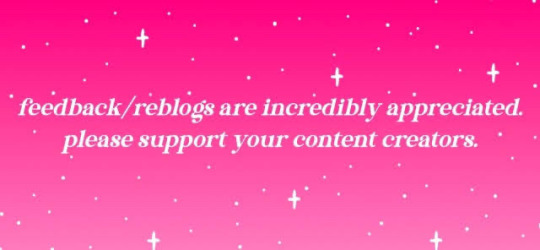

Taglist: @queenslandlover-93 @anangelwhodidntfall @austin-butlers-gf @butlersluvbot @killerqueenfan @kittenlittle24 @beauvibaby @kingelviscreole @justjacesstuff @sweetheartlizzie07 @coldonexx @londonalozzy @kaycinema @annamarie16 @adoreyouusugar @djconde58 @mirandastuckinthe80s @luke-my-skywalker @tubble-wubble @apparently-sunshine @kisseskae @whotfatemywaffles @gyomei-tiddies @friedwangsss @shynovelist @sassy-ahsoka-tano @she-is-juniper
#austin butler#austin butler x reader#austin!elvis x reader#elvis x reader#elvis presley x reader#austin butler fic#austin butler imagine#austin butler fanfiction#elvis (2022)#elvis 2022#elvis biopic#elvis baz luhrmann#my writing#ickkspty#i can’t keep kissing strangers pretending they’re you
2K notes
·
View notes
Text
Book recs: post- and transhumanism
AKA: cyborgs, uploaded minds, and humans otherwise altered by technology.
I have previously written a rec list for books featuring robots and artificial intelligences, but ended up excluding various titles for not quite fitting the theme. Hence, this list, which focuses more on the step from human into something else, commonly with themes of what it means to be human.
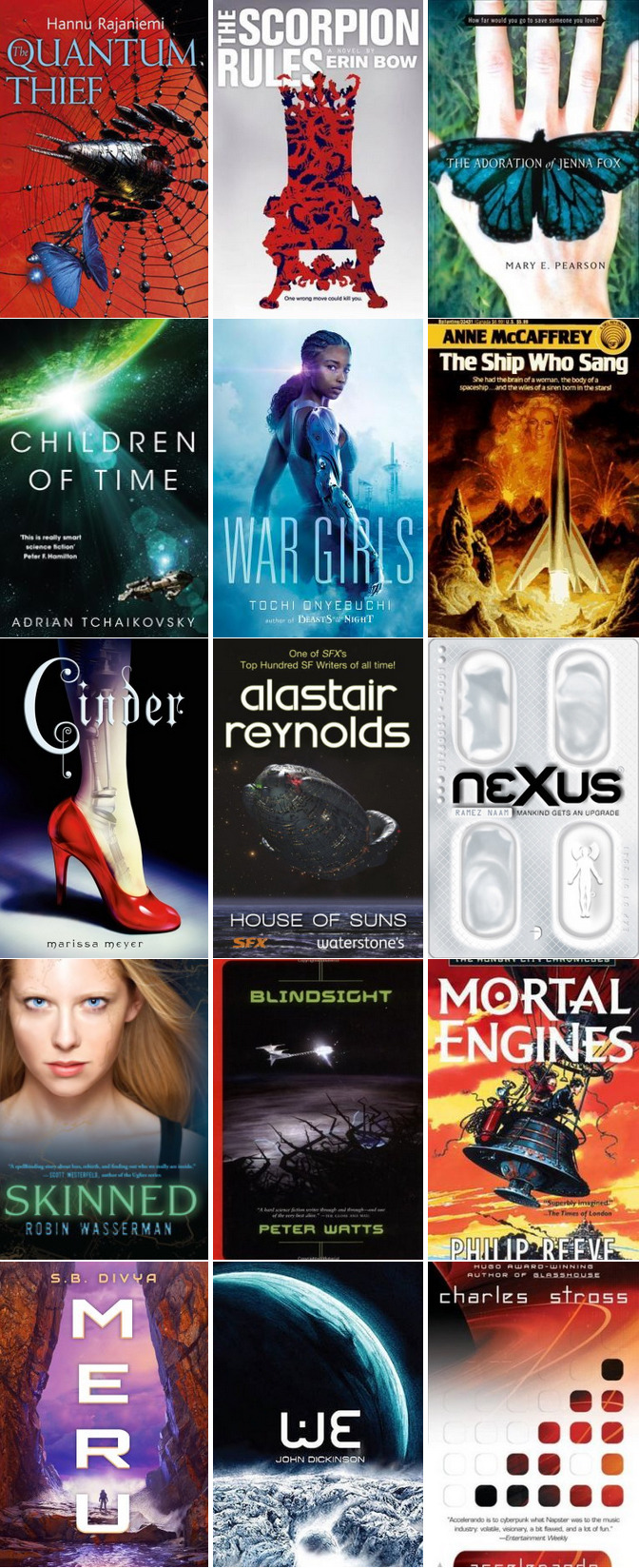
Previous book rec posts:
Really cool fantasy worldbuilding, really cool sci-fi worldbuilding, dark sapphic romances, mermaid books, vampire books, portal fantasies, robots and artificial intelligences
For more details on the books, continue under the readmore. Titles marked with an * are my personal favorites. And as always, feel free to share your own recs in the notes!
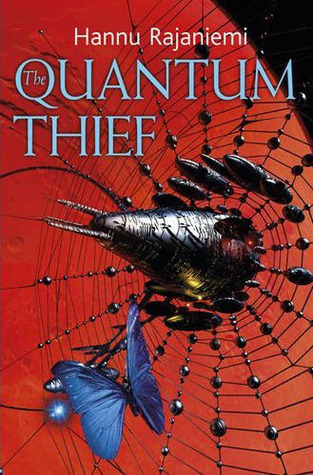
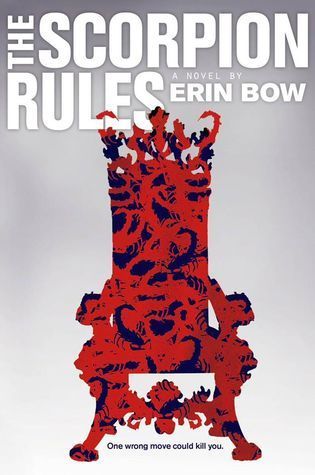
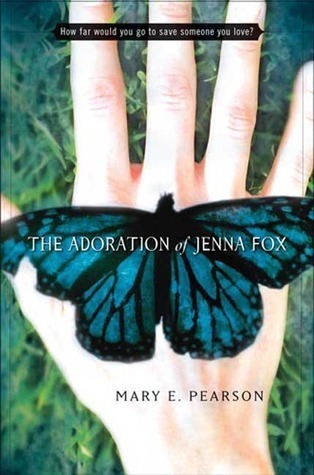
The Quantum Thief by Hannu Rajaniemi*
Place this one in the category of ‘accept that you’re gonna be confused as hell and just let the world wash over you’. The singularity has come and gone and humans can now easily upload, download and copy themselves into new bodies, not all of them human and not always willingly. Consciousnesses and time has become something close to currency. Follows a murder mystery on Mars.
The Scorpion Rules (Prisoners of Peace duology) by Erin Bow*
Young Adult. Featuring a dystopian future in which an AI forcibly keeps world peace by holding the children of world leaders hostage. If anyone attempts to start a war, their child will be executed. Greta is one of these children, kept in a school with others like her. But things start to change one day when a new, less obedient hostage arrives. A unique, slowburn take on the YA dystopian craze, also featuring a bisexual love triangle.
The Adoration of Jenna Fox (Jenna Fox Chronicles) by Mary E. Pearson
Young Adult set in a near future. Jenna wakes from a year long coma after an accident, and something is wrong. Is this really her life? Are her memories her own? Exactly what happened a year ago, and what did her parents do to get her back?
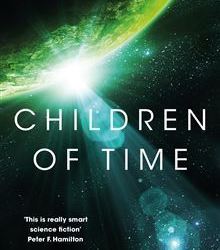

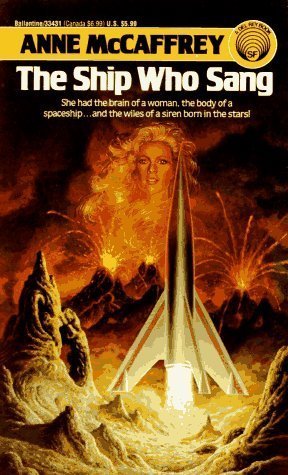
Children of Time by Adrian Tchaikovsky*
Millenia and generation spanning scifi. After the collapse of an empire, a planet once part of a project to uplift other species to sentience is left to develop on its own, resulting not in the intelligent monkeys once intended but in sentient giant spiders. Millenia later, what remains of humanity arrives looking for a new home, only to be met by the artificial remains of the ancient woman who once led the uplift project - and she is not willing to let them on her planet.
War Girls by Tochi Onyebuchi*
In an enviromentally fraught future, the Nigerian civil war has flared back up, utilizing cybernetics and mechs to enhance its soldiers. Two sisters, by bond if not by blood, are separated and end up on differing sides of the struggle. Brutal and dark, with themes of dehumanization of soldiers through cybernetics that turn them into weapons, and the effect and trauma this has on them.
The Ship Who Sang by Anne McCaffrey
1969 classic. Features a future in which children born too weak to survive are put into and raised in mechanical bodies. Helva, one of these children, grows up to be put in charge of her own space ship, from which she works to fulfill various missions out in space, missions which she quickly comes to learn are much more dangerous than she could've imagined.
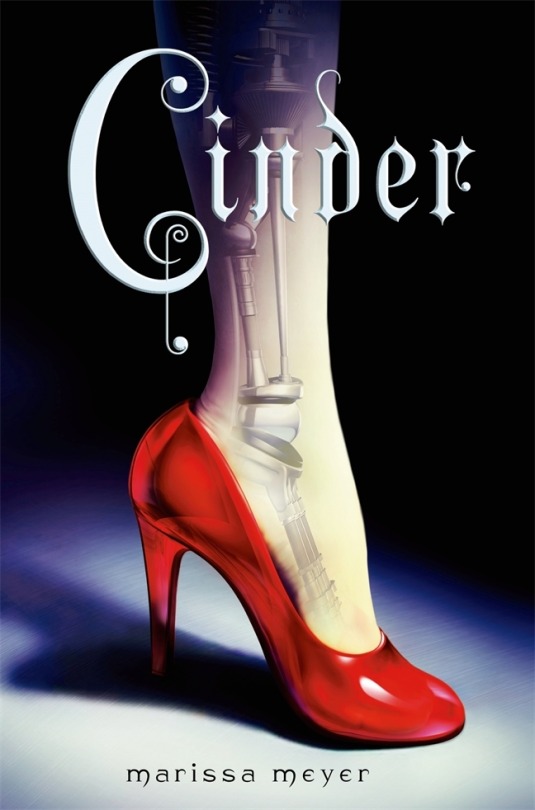

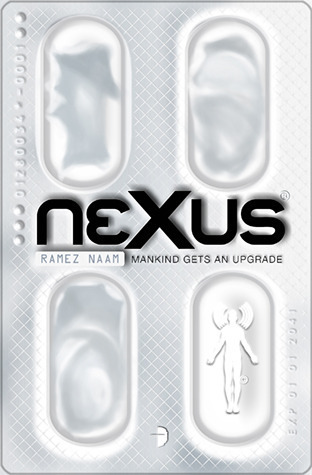
Cinder (The Lunar Chronicles) Marissa Meyer*
Young Adult fairy tale retelling. Cinder, a cyborg with a mysterious past she can't remember, lives with her stepmother and two stepsisters in New Beijing as a deadly plague ravages the world and a race of Lunar people threaten war against the entire planet. As Cinder becomes entwined with the young prince Kai, she is pulled more and more into dangerous politics that see her as less than human due to her cybernetics, yet need her to save them.
House of Suns by Alastair Reynolds
Six million years in the future, humanity has spread across the entire Milky Way galaxy. Purslane and Campion are both clones of the same woman, sent into the galaxy millions of years ago to explore along with almost a thousand clones like them. Every 200 000 years they all meet to compare memories and experiences. But this time Purslane and Campion arrive late - and discover that a secret millions of years in the making has lead to an extinction level attack against their kind. Now they must find out the truth before their line is completely wiped out. Absolutely wild world-building, featuring various kinds of posthumans (among which the clones are, shockingly, the most similar to people of our time).
Nexus (Nexus trilogy) by Ramez Naam
In a near future, a nano-drug is developed that can link human minds together, having the potential to change humanity forever. As different factions fight over it - some wanting to control it, other to eradicate it, and many to exploit it - a scientist who's caught improving the drug is thrust into a world of danger and international espionage.
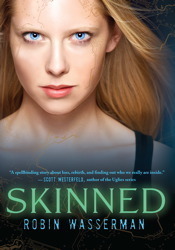
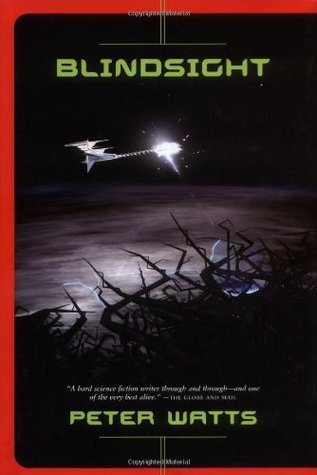
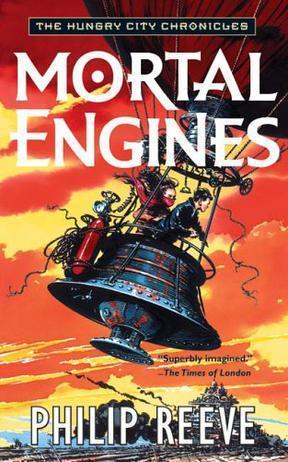
Skinned (Cold Awakening trilogy) by Robin Wasserman
Young Adult. Rich girl Lia Kahn had the perfect life - until she died and was brought back by having her memories downloaded into a mechanical body. Despite having her life back, Lia also finds her life changed, as people fear her and treat her differently. Worse; she herself isn't sure if she's still really Lia, or whether she's even a person at all anymore.
Blindsight (Firefall duology)by Peter Watts*
Vampires and aliens and questions of the nature of consciousnesses, oh my. A ship is sent to investigate the sudden appearance of an alien vessel at the edge of the solar system, but the crew, a group of various level of transhumanism, isn't prepared for the horrors awaiting them. No, seriously, this book will fuck you up, highly recommend if you’re okay with a lot of techno babble and existential horror.
Mortal Enginges (Mortal Engines quartet) by Philip Reeve*
Young Adult. On a barely survivable Earth humanity has taken to living on great wandering cities, hunting each other across the plains for resources. Tom lives in London, but when he intervenes to stop a murder, he falls off the city alongside a strange and hostile girl on the hunt for revenge. Together they set out to catch up to the city, but are chased by a murderous machine like being set on stopping them. Trans/posthumanism isn't the main theme of the book, but it continues to grow in importance throughout the series.
Bonus AKA I haven't read these yet but they seem really cool
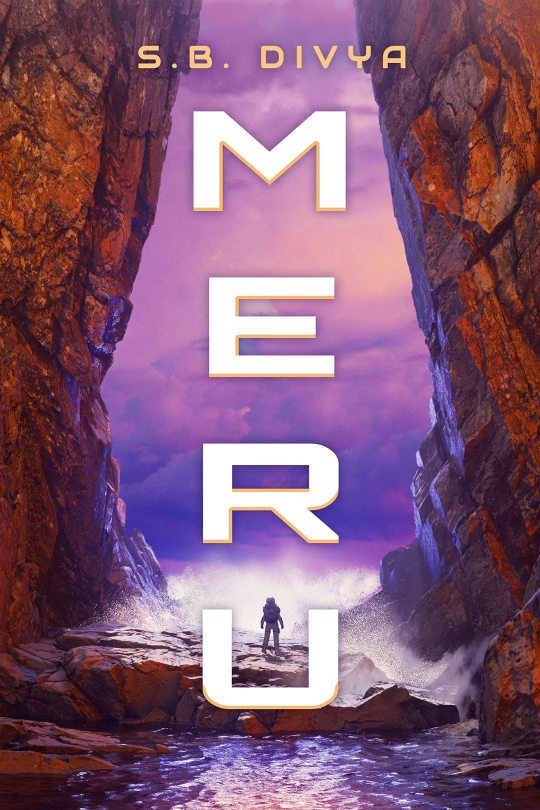
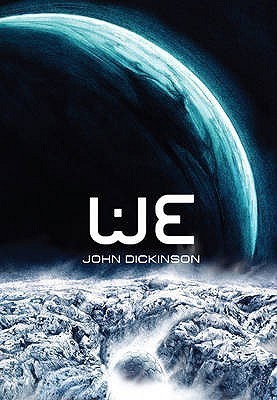
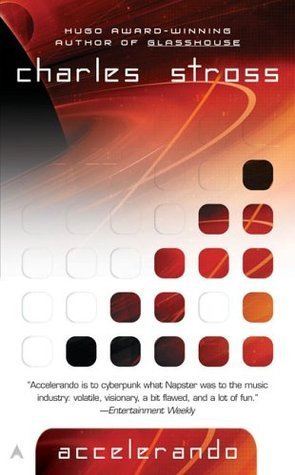
Meru by S.B. Divya
A human and a posthuman, called an alloy, venture together into space to explore a newly discovered, earth-like planet, testing the future of the relationship between their peoples on the way.
WE by John Dickinson
Humanity has become a hive mind, constantly connected. When Paul is sent on a one-way mission to a frozen moon, he must disconnect from the rest of humanity, for the first time seeing what it has truly become.
Accelerando by Charles Stross
In a time in which the artificial and the posthuman is more and more outpacing the human, something strange enters the solar system and starts dismantling its planets.
Honorary mentions AKA these didn't really work for me but maybe you guys will like them: We Are Legion (We Are Bob) by Dennis E. Taylor, Down and Out in the Magic Kingdom by Cory Doctorow
#surprise I'm back!!#i still have a couple of these posts in my drafts#next one will probably be the alternate timelines one i just need to wait out the library waiting list first lmao#nella talks books#the quantum thief#the scorpion rules#the adoration of jenna fox#children of time#war girls#the ship who sang#lunar chronicles#house of suns#nexus#cold awakening#blindsight#mortal engines
29 notes
·
View notes
Text
#austenread22 / persuasion final thoughts

WELL. It’s been an eventful month for this book, hasn’t it? Reading it right after Northanger felt like a nice little bookend, and made it easier to track the evolution of Jane’s writing style over the course of those 14 years. Jane the Author can never help making her presence known, but in Persuasion she becomes mostly invisible and lets Anne take the lead - which is probably why, out of all her canon, those who value the Austen’s wit and momentum find themselves a bit bored by Perusasion’s sedate and more internal tone.
I’ll be discussing points that stood out to me during my reread below the cut.
This is more of a general observation, but something that really jumps out at me is the way Jane opts for plot simplicity in this case, in favor of psychological complexity. Don’t get me wrong - all of her books evince an understanding of human nature, both as individuals and as working parts in a(n upper-middle-class) community. But S&S and P&P juggle the storylines of two sets of sisters, and Emma, as P.D. James pointed out, could have been a detective novel. They are plot-heavy works; the internal goings-on of her characters’ minds must be parsed and funneled through the domestic dramas of Wickhams and Lady Catherines and Mr. and Mrs. Eltons. As readers, we can choose to overlook the nuances and take the storylines at face-value because there is so much there already. This is impossible to do with Persuasion. What actually happens over the course of 200 pages? Anne Elliot’s family is short on money and must let their home to Admiral Croft; they go to Bath, she stays with her younger sister and cousins in Somserset, where she runs into her former fiancé; they visits Lyme; she reunites with her family in Bath, reconnects with her ex, and in the end they get back together. Sure, she has a nefarious suitor - but Mr. Elliot is no George Wickham, and her rival Louisa Musgrove is no Mary Crawford. There are no subplots to hide behind, no ruinous elopements, no potentially disastrous underhanded trickery - we must invest in Anne.
Comparing her works, I’d say Persuasion has the most in common with Mansfield and Northanger Abbey. Though sizable and full of the ups-and-downs which characterize her other, more popular works, Mansfield’s heroine is as internal as Anne - and she is easier to miss because she is reactive as opposed to proactive, dutiful, her will easier to bend in some respects.
As for Northanger, it’s a straight-forward coming-of-age novel, mostly concerned with the changes occurring within its central heroine. We may think of the coming-of-age novel as belonging to adolescents and/or young(er) adults, but I would say Anne is also coming of age during Persuasion. She is no longer young, the door of possibility seems to be closing on her forever, and we find a woman resigned, trying to find contentment with her situation in life. She isn’t old, exactly. But the bloom of her youth has passed, and like Catherine, she finds herself in an in-between - albeit with the wisdom acquired through age and life experience.
Like Northanger, the subplots are kept to a minimum, and like Northanger and Mansfield Park, Anne has (virtually) no independent fortune and so is dependent on the goodwill of others. But she is old enough to moderate that dependency, at least on an emotional level. She gets to place boundaries and abide by them; she gets to choose to whom and what she owes a duty.
Now jumping into the actual meat of the novel... I was reminded of Emma during one of our introductions to Lady Russell. I remember noticing how Emma Woodhouse was raised in the belief that to be loved, she had to be perfect. She had to live up to the ideal of being the leading lady in Highbury. Lady Russell, on the other hand, loves best those who adhere to her counsel. Of Elizabeth, we are told: “She [Lady Russell] had never received from her more than outward attention, nothing beyond the observances of complaisance; had never succeeded in any point which she wanted to carry, against previous inclination.” Unlike Anne, Elizabeth Elliot is too proud to fall under her persuasion, and Captain Wentworth, having no ties of affection, owing nothing to Lady Russell, not sharing her “value for rank and consequence, which blinded her a little to the faults of those who possessed them,” committed, during his courtship of Anne, the cardinal sin of not being deferent. “He was brilliant, he was headstrong,” we are told, and “Lady Russell had little taste for wit, and of anything approaching to imprudence a horror.” This last bit, “imprudence,” comes after a description of Wentworth’s confidence, his belief in his own abilities and his own good luck, his assurance that life will always work out in his favor. These are the qualities, I’m sure, that allow him to rise in rank and fortune, even after being disappointed in love. It is why Admiral Croft and his military friends admire him. It is also why Lady Russell and every Elliot except Anne seems to disdain him.
Sir Walter’s hatred for social climbing is as insufferable as it is hilarious. He has a bone to pick with the Navy, “first, as being the means of bringing persons of obscure birth into undue distinction,” and also because the exposure to the elements turns men ugly.
“He had frequently observed, as he walked [in Bath], that one handsome face would be followed by thirty, or five-and-thirty frights.”
And when he’s informed that Admiral Croft is coming to Bath for his gout, he greets the news with an exclamation that never fails to make me laugh out loud - “Gout and decrepitude!” - when earlier in the novel he had declared Croft the best-looking sailor he had ever come across. If given the choice between becoming dirt poor and losing his title, or losing his hair and giving in to “gout and decrepitude,” I’m honestly unsure as to which, in Sir Walter’s eyes, would constitute the lesser evil.
The subjectivity of perceived motives is constantly at play in the relationship between Wentworth and Anne. She believed herself “prudent, and self-denying” in giving him up, partly for his own good; whereas Wentworth believed “she had given him up to oblige others.” “It had been weakness and timidity,” and as a result, “her power with him was gone for ever.” In conversation, he declares “it is the worst evil of too yielding and indecisive a character, that no influence over it can be depended on.” Here, he displays a rigidity to match Lady Russell’s, except in a different direction, and we can imagine how painful it was for Anne during her original courtship to be caught between these two strong personalities, both having full conviction that they are right and that Anne must relent and see things their way, that choosing one would necessitate giving up the other.
Anne thinks Wentworth must have been “either indifferent or unwilling” to reconcile with her. “Had he wished ever to see her again, he need not have waited till this time.” Which, we later learn is actually true, so she’s not being self-pitying or imagining something which isn’t true. It is, lol. He admits to having been proud and resentful, so I think it’s fair to say that Anne’s perceptive powers are a little (a lot) sharper than his.
One of Persuasion’s most famous lines: “She had been forced into prudence in her youth, she learned romance as she grew older.” I think in my earlier readings I took this to mean that prudence and romance exist in two separate spheres, but this time around I’m inclined to believe that Anne learned to stack romance on top of prudence. It isn’t that she gave up or lessened the degree of her prudence; it’s that maturity taught her that one can be romantic and prudent. It’s the Catherine Morland/Dashwood lesson - one must learn to moderate emotion with reason. Like Elinor, experience has taught Anne the importance of letting her heart lead some of the time, and I imagine the pain of disappointed love has worked in her a softening effect. At the very least, she takes special notice of the dynamics between married and courting couples. “She always watched [the Crofts] as long as she could, delighted to fancy she understood what they might be talking of.” She becomes a voyeur of happy (happier?) families, and this is a result of not having one of her own.
It sets my blood boiling in a Mansfield way reading the way Anne is treated by her father and sisters. After letting Kellynch, Elizabeth agrees that Anne should go to Mary instead of accompanying her and their father because “nobody will want her in Bath.”
“Nobody will want her” seems to be the motto for Anne’s family dynamic, and it’s just so sad finding passages in the novel that illustrate how important it is to Anne to feel useful, how she equates usefulness with a greater chance of being loved. She believes that “to be claimed as a good, though in an improper style, is at least better than being rejected as no good at all.” And really, having her capableness acknowledged is the least anyone can do. At Lyme, immediately after Louisa’s accident, everyone is a mess without her guidance! “Anne, Anne,” cries Charles, “What is to be done next? What, in heaven’s name, is to be done next?” Um, idk guys, maybe call a doctor? In the aftermath Wentworth says “...no one [is] so proper, so capable as Anne,” and “the remembrance of the appeal [that she should stay with and tend to Louisa] remained a pleasure to her, as a proof of friendship, and of deference for her judgment, a great pleasure.”
Anne has been so used to having her opinions overlooked, her worth ground into dust, that being admired for her good sense and judgment among the Uppercross set is like a dreamy Hawaiian vacation. By no means is that party without its faults. But it is such an overdue pleasure, seeing Anne acknowledged, especially after sentences such as these, which are specific to her playing but which I contend apply to Anne in general: “She had never, since the age of fourteen, never since the loss of her dear mother, known the happiness of being listened to, or encouraged by any just appreciation or real taste.”
I think it’s important to really dig into these details about Anne, to really imagine her life as an unwanted member of her family. A lot of Austen’s heroines have to battle this foundation of trauma, actually. Even Elizabeth Bennet is her mother’s least favorite child. They all deal with it in different ways, and Anne’s method for coping sheds so much light on her character, her motivations, the reasoning behind her actions. Consider the way her mind works when she starts associating with the Musgroves: “With the prospect of spending at least two months at Uppercross, it was highly incumbent on her to clothe her imagination, her memory, and all her ideas in as much of Uppercross as possible” in order to “become a not unworthy member” of the party. Anne Elliot has trained herself from a very young age to enter a room and assess the ways to optimize her usefulness. She “clothes” her imagination. She is a chameleon, in her own understated way, and once she is aware of the role she is to play on any given occasion, the role becomes her anchor. It gives her purpose; it bolsters her resolve.
Take, for instance, the occasion when Lady Russell and the Elliots ignore Captain Wentworth at a party: “Elizabeth had turned from him, Lady Russell overlooked him; [Anne’s] nerves were strengthened by these circumstances; she felt that she owed him attention.” And she pays it - she gives Captain Wentworth his due regardless of awkwardness or difficulty or his hot-and-cold demeanor towards her. She identifies her duty, and once it is done, once she has had the reward of discovering that Wentworth doesn’t seem all that cut up over losing Louisa, she “[gives] herself up the demands of the party.”
Anne uses this process of tempering her feelings using her logical mind quite often. She’s a quintessential introvert, requiring time on her own to sort out and make sense of what she’s observed and the emotions that arise in her. She judges Wentworth’s behavior “from her knowledge of his mind.” And of her own, “she ha[s] some feelings which she [is] ashamed to investigate” when she begins to suspect Wentworth’s returning affections. She wants to believe, but she is disturbed that she cannot “understand his present feelings” and trying to make sense of them, imagining what a second chance might look like after thinking that possibility was gone, “occupie[d] and flurried her too much to leave her any power of observation.” She completely overloads, and these are the moments which make us - as readers - want to yell in all caps!!!! If we have invested in Anne, if we have believed in her as a heroine as potentially compelling as a Lizzy or an Emma, this is where that pays off.
Comic relief of the moment: Anne wishing Benwick would moderate his feelings and read less poetry 😂 (Sidebar: what would Marianne Dashwood make of Captain Benwick? 👀)
Want some more clownery? Wentworth inwardly swearing that Anne has no more power over him in the same chapter, in the same page I believe, as this: “Anne Elliot was not out of his thoughts, when he more seriously described the woman he should wish to meet with. ‘A strong mind, with sweetness of manner,’ made the first and the last of the description.”
In actuality, Wentworth has no damned idea what he’s talking about. The concept of strength is also discussed quite a bit in Perusasion, using Anne and Louisa, and to a different extent, William Elliot, as different modalities of strong-mindedness. “I am determined I will” is a line of Louisa’s, and I think it sums up her character quite well. Anne and Mrs Croft consider her fall in Lyme as “the consequence of much thoughtlessness and much imprudence,” and it is very hurtful to Anne to feel herself wanting in Wentworth’s eyes over a matter upon which she believes herself deeply misunderstood. Stubbornness is not strength in Anne’s book. Before his treachery is known, she describes Mr Elliot as “never run away with by spirits or by selfishness, which fancied itself strong feeling.” Clearly, Anne has Louisa in mind when she is thinking this, and on another occasion, she defends Benwick to Admiral Croft when he relates his engagement to Louisa: “She...only meant to oppose the too common idea of spirit and gentleness being incompatible with each other.” Anne knows what people think of her. Here, she reminds of me Jane Eyre, who famously said, “Do you think, because I am poor, obscure, plain and little, I am soulless and heartless?” Anne has a whole world inside of her, a strong mind and strong feelings, and though, like her playing, she has had to content herself with pleasing only herself, not counting on others to give her love and validation, she would like to be valued. She would like to be loved. And this is why the loss of Wentworth hurts so much, because Wentworth recognized her from the start. He saw her worth; he fell in love with her, not because of her usefulness, but because of who she is as a person. “Once so much to each other! Now nothing!” “...There could have been no two hearts so open, no tastes so similar, no feelings so in unison, no countenances so beloved.”
And so, to win back Anne, Wentworth has to learn “to distinguish between the steadiness of principle and the obstinacy of self-will, between the darings of heedlessness and the resolution of a collected mind.” Anne is not weak. She did not break her engagement because Lady Russell was too strong. Anne broke it because she considered it best. Because her instinct is to do what’s best regardless of the cost. Like Fanny Price, when she is certain of being right, she will withstand all kinds of social displeasure. Anne herself tells us within the narrative that she ended things with Wentworth because the cons outweighed the pros. And then we get to meet her old school friend Mrs Smith and we see with our own two eyes what her future might have been like, how dire is the situation of a woman alone in the world after making the wrong choice of husband. Anne is not a coward, Anne was not being overly cautious. Anne was being prudent, employing that good sense no one of her acquaintance can deny. Is it romantic? Maybe not the way Wentworth sees it. But Wentworth is a man, a man of a particular kind of character. He will never fully understand Anne’s reasons, but Austen herself never doubts them.
Let’s circle back now to one of my favorite Austen Tropes - the dysfunctional family. We’ve already established that the last member of Anne’s family to truly love her was her deceased mother. Her father is a vain snob, and because he is a vain snob, the only daughter he pays attention to is Elizabeth. Elizabeth is beautiful and very much like him, which I’m sure is catnip to a narcissistic personality. The other object of their contempt is Mary, who didn’t marry as well as she could have and is thus unworthy of their attention. Mary is without Anne’s good sense, and so she is often jealous, competitive with her mother-in-law and constantly meddling in Louisa and Henrietta’s prospects. Despite this, I feel quite sorry for Mary and I don’t dislike her, not the way I dislike Elizabeth. Anne serves a big contrast here as well. She observes the marital happiness of the Crofts and the Harvilles; sees the bond of friendship between the admiral, Wentworth, Harville, and Benwick; observes the imperfect but warm contentment of the Musgrove family... and “though she sighed as she rejoiced, her sigh had none of the ill-will of envy in it.” To a number, they are all her inferiors in class and station, yet “how much more interesting to her was the home and friendship of the Harvilles and Captain Benwick, than her own father’s house in Camden Place, or her own sister’s intimacy with Mrs Clay.” She values people for who they are, their character, their treatment of others, and ergo she rejoices in their joy. She doesn’t resent their triumphs. Even when she believes Wentworth’s marriage to Louisa is a done deal, she thinks of Uppercross and imagines it full of “all that was glowing and bright in prosperous love, all that was most unlike Anne Elliot!” Maybe she’s being a little maudlin and self-pitying here, but she never lays the blame on Louisa’s door, never besmirches her as a woman. So, no, Anne is not blind to the follies of others, and she does smile to herself, does remark upon the ridiculousness of her acquaintance, but only in the privacy of her own thoughts, and never to the point of endangering her ability to be civil and proper and all that she ought to be, socially. That isn’t Anne’s way. A woman who has spent her life being subjected to throwaway comments like “Oh, she’s nothing!” knows all too well the power and effect of words.
One of my favorite moments in the novel is when Elizabeth and Sir Walter enter the Musgroves’ room at the inn in Bath and everything goes silent. “Anne felt an instant oppression, and wherever she looked saw symptoms of the same.” Not only does this prove how truly annoying Elizabeth and Sir Walter are, but it’s nice to have Anne’s feelings confirmed by those around her. She isn’t imagining it - her dad and sister are that bad.
Sir Walter is probably the Austen character most concerned with appearances. He spends a lot of lines judging the looks of both men and women, which is why I think it’s no small detail that Anne grows in beauty throughout the course of the plot. Though she’ll never be as attractive as her older sister, we are told that Wentworth once thought her pretty, that he was surprised to see her looks so changed since their last meeting. She goes from looking frail, like a wilted flower past its bloom, to “improved in plumpness and looks.” Regaining hope of Wentworth and the making of new friends - friends who respect and have real affection for her - has done it, and when she becomes certain of Wentworth, when she is sure that his affections still lie with her, “her eyes were bright and her cheeks glowed; but she knew nothing about it.” Her happiness, Austen says, is from within, and it is made of sturdier stuff than mere youth and unlined skin. Even a woman past her bloom may still grow into beauty; all she has to do is find her own definition of happiness. (Meanwhile, the sycophantic Sir Walter and Elizabeth Elliot will always find themselves an oppressive nuisance despite their good looks.)
Now we move into the plot of Mrs Smith, who rightly said, “There is so little real friendship in the world!” In her, we see one of Anne’s possible futures, a future not uncommon for 19th century women who have fallen out of favor through poor widowhood. Unlike the Bateses in Emma, Mrs Smith has no one to help her until Anne, and her situation is truly uncertain. Nevertheless, Anne observes in her an “elasticity of mind” which Anne also possesses - emotional resilience, as a modern psychologist would say. They have a “disposition to be comforted, that power of turning readily from evil to good, and of finding employment which [carries them] out of [themselves].” Even if she hadn’t reunited with Wentworth in the end, I have a feeling Anne would be okay and Mrs Smith would somehow find a way to continue making it through. Their inner strength is consistent, steady, not overtly optimistic, but reliably practical. Still, through Mrs Smith we have the reminder that Anne (and any woman, really) is wise to be cautious in matters of marriage and love.
Interestingly, despite being snobs themselves, Lady Russell and Mr Elliot do not find fault with Anne for maintaining a friendship with Mrs Smith. On the occasion of Anne’s declining a dinner invitation, and being curious as to what transpited in her absence, her “greatest interest must be, in having been very much talked of between her friend [Lady Russell] and Mr Elliot; in having been wished for, regretted, and at the same time honoured for staying away in such a cause.” Again, we see how much Anne wants to be valued. We also see that in the Scale of Snobbery, Elizabeth and her father are on a whole other level. (Or, it could just be Elliot being a scheming sneak.)
On the subject of Elliot being a scheming sneak, Jane Austen never makes us feel we should condemn Anne, or any of her heroines for that matter, for being fond of male attention. Anne is flattered by Mr Elliot’s interest, until he refuses to take a hint. And she does turn over in her mind the prospect of being of use to her family, and of reclaiming her dear mother’s position as mistress of Kellynch Hall. But ultimately these inducements aren’t enough to make her act against her conscience - which is the same thing she did with Wentworth the first time around. The truth is, she knows she can’t trust William, and she knew it before Mrs Smith reveals the truth of his plan to weasel into the Elliots’ lives to ensure Sir Walter wouldn’t marry Mrs Clay. Anne has always “felt that she could so much more depend upon the sincerity of those who sometimes looked or said a careless or a hasty thing, than of those whose presence of mind never varied, whose tongue never slipped.” Austen herself is wary of appearances. All of her villains are outwardly charming, they all hide their bad intentions underneath the kind of facade that is valued by society at large - good looks, flattery, wit. Our human propensity to fall for such trappings is what makes us ignore the value of a Fanny or Anne, what makes us unwilling to unlock the great goodness found in men like Darcy and George Knightley. Anne is such a skilled reader of people that even when she couldn’t pin down what was wrong, she knew something was. She listened to her gut, she was not guided by either Elliot’s persuasions or Lady Russell’s - though she admits that she might have been induced, I choose to believe that Anne would have stuck to her guns.
Austen makes interesting commentary through Anne and Mrs Smith during this discussion of Mr Elliot. Anne says, “In marrying a man indifferent to me, all risk would have been incurred, and all duty violated.” It seems to me that while Jane condemns mercenary marriages, she does acknowledge uneven unions - the love match is the ideal, the purest form of matrimony, but financial considerations mean that in a lot of cases, marriages will occur between people not in love. And it isn’t the not being in love that Austen objects to, it’s the contracting of marriage for the wrong motive, or marriage where one or both parties is being deceitful. In either case, it is the woman who has the most to lose, and so marrying a man indifferent to her would not only be morally wrong to Anne, but it would also put her in the position of most risk.
Before I bring this eternal compilation to a close, I would like to share two more of my favorite bits of dialogue, the first courtesy of our beloved Captain Fred:
“Now I have done,” cried Captain Wentworth. “When once married people begin to attack me with,—’Oh! you will think very differently, when you are married.’ I can only say, ‘No, I shall not;’ and they say again, ‘Yes you will,’ and there is an end of it.”
MOOD.
And another Laugh Out Loud moment, brought to you by Elizabeth Elliot:
“I really cannot be plaguing myself for ever with all the new poems and states of the nation that come out. Lady Russell quite bores one with her new publications. You need not tell her so, but I thought her dress hideous the other night. I used to think she had some taste in dress, but I was ashamed of her at the concert. Something so formal and arrange in her hair! and she sits so upright! My best love, of course.”
....all I can say to that is -
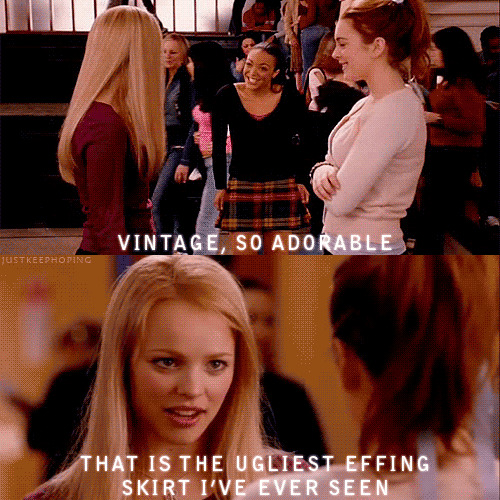
tagged: @lostandfound922, @thatscarletflycatcher
#austenread22#persuasion#anne elliot#jane austen#book club#sense and sensibility#pride and prejudice#mansfield park#emma#northanger abbey#sanditon
198 notes
·
View notes
Text
Goldstone Wood and the Oddness of Christian Fantasy

Princess Varvare in a kingdom of roses
I want to share some illustrations inspired by the Tales of Goldstone Wood series by Anne Elisabeth Stengl. It's a Christian fantasy series that I really like. Give me a moment to talk about that – unless you absolutely love Christian fantasy, all Christian fantasies, in which case, maybe skip this.
I spent a chunk of the early 2000s defending fantasy as a genre to a variety of Christians I ran across – not the majority, but still a variety of them – both in my head and to their faces. The preacher who said, from the pulpit, that Harry Potter was Satanic. Writers explaining why JRR Tolkien and CS Lewis were (of course) okay, but all other fantasy novels were suspect. Websites that dissected the occult symbolism you never realized was buried in fantasy media. My friend who frowned at me in concern and said she wouldn't want to have to explain to God why she read “that kind of thing” when she met him after death.
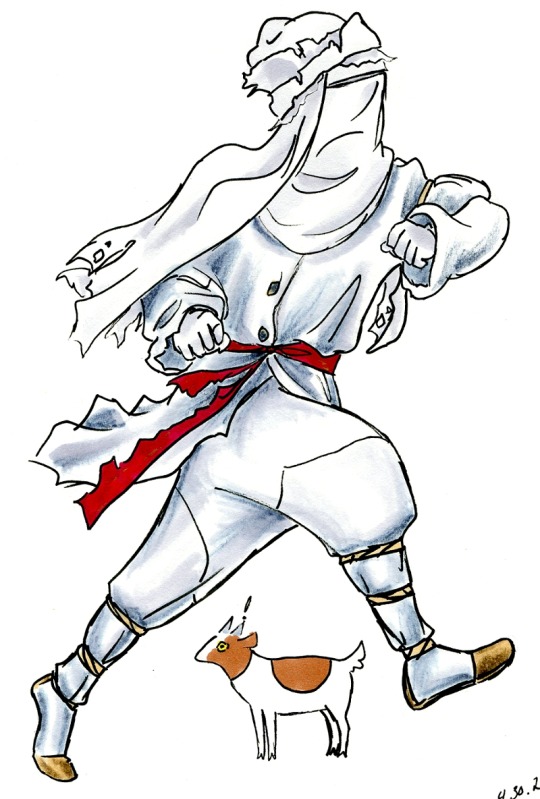
This is Rosie (and her goat Beana, who talks.) I love Rosie utterly, she tries so hard and she feels things so much. The next image is a spoiler, showing her unveiled.
I think that's partially why I'm interested in the genre of Christian fantasy, this attempt to make these two things fit. For me, the fusion often doesn't work. Either writers mix theology and fantasy in a weird confusing way. (Wait, you just had your heroine marry an angel. Do you actually think that happens? Which parts of this actually reflect your belief system?) Or they play things extremely safe and traditional. (Oh boy, another story about a young farm boy who's going to go on a quest and fight the Satan figure and become a hero while his girlfriend does... something peaceful off-screen.) Or they try to be another Lewis in the belief that since Lewis and John Bunyan did it, allegory is an acceptable vehicle for fantasy, and let's be really obvious about the symbolism. (I bet this demon symbolizes evil.) I read Christian fantasy, but it's partially optimistic curiosity, it's partially pessimistic irony, and I haven't found many that I'd recommend.

Rosie unveiled.
But I do like Tales of Goldstone Wood, at least what I've read so far (still missing a few of the installments). I like it enough that I would recommend it to a Christian who wants to read fantasy, or a fantasy reader who doesn't mind Christian themes. Anne Elisabeth Stengl often approaches the Christian elements indirectly, from less obvious angles, so you don't have all the heavy-handed symbols you see in the Lewis and Tolkien knockoffs. She has many, many interesting female characters and a lot of humor. Her series also builds, adding complexity to the world and characters with each installment, many of the characters showing up in multiple books.

Varvare and the unicorn. This unnamed unicorn is one of my favorite elements of the third book – beautiful but dangerous and eldritch. Corrupted – but not exactly evil.
Stengl's also not afraid to get weird and fey with her fantasy elements, at times reminding me strongly of things like Labyrinth, The Neverending Story, and no end of Celtic and European folklore. Her magical characters are unpredictable, merry, fearsome, and unabashedly over the top. Her heroes have depth, flaws to go with their heroism, and never become morally perfect even after their conversions – unlike in so much Christian fiction. Much of Christian fantasy bears the thumbprint of CS Lewis; in Stengl's case, though her writing shows clear nods to Lewis (and not just his Narnia books), she isn't trying to replicate him. These aren't books that Lewis would have written.
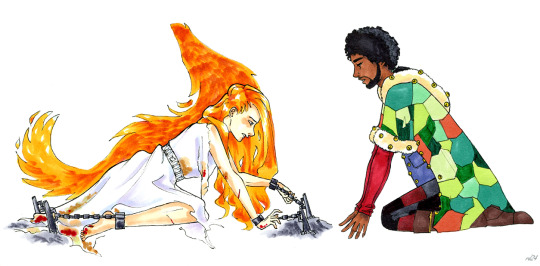
Daylily and Lionheart. If the series has a protagonist, it's probably Lionheart there on the right. He seems to be doomed to keep showing up in different story arcs, and he's always interesting.
I recommend you begin with the first one, Heartless. Though Heartless is the least ambitious/unique entry – it's straightforward and, of all of the books, the most directly allegorical. (I bet this guy's the Jesus figure. Yep, yep he is.) But it lays the foundation for the world and establishes many of the central characters, including my favorite Eanrin, the blind cat-shapeshifting bard-knight with the heroism of a knight, the selfishness of a cat, and endless flair. Stengl does explore Christian themes, but at the same time she clearly wants to create beautiful language, memorable characters, and engrossing stories. The stories and characters don't feel secondary to the message.

Eanrin, I like him a lot. He also shows up in almost every book, at least the main books, sometimes pre-injury, sometimes post-.
My favorite book is Starflower, the fourth, because of its courageous heroine (who grows into the librarian-knight Imraldera we see in other books), its twisted echoes of “Beauty and the Beast” and Till We Have Faces, and its focus on, who else, Eanrin in his younger years, before he's really gotten that whole hero thing worked out.
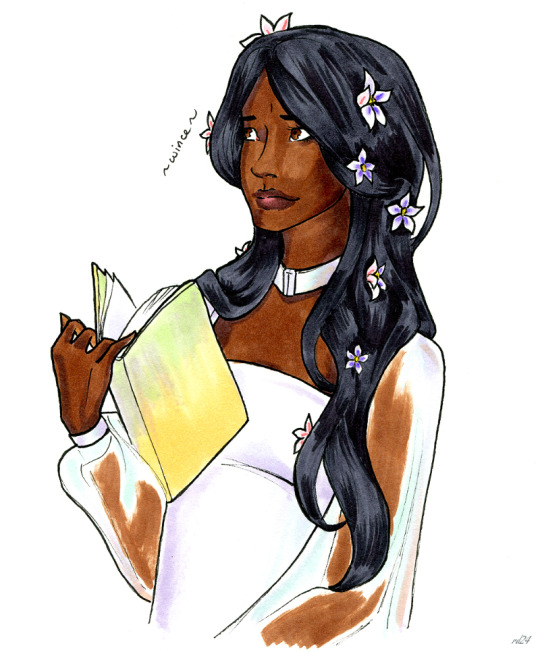
Imraldera. (She's looking at Eanrin.) The series is allegedly over, but I feel like there are still some narrative threads hanging, including with Imraldera here. My hope is that the author returns to the series someday.
As with any recommendation, this isn't a blanket recommendation; you may find things in here you don't like. I don't sign off on every element as perfect. But Christian fantasy is a small genre, it's a weird genre, in my opinion it's often a clumsy genre. Goldstone Wood is proof that it can produce interesting, original material – stuff not merely “good for a Christian fantasy”, but just a good series, period.
#tales of goldstone wood#anne elisabeth stengl#christian fantasy#imraldera#rosie (togw)#beana#eanrin#daylily (togw)#lionheart (togw)#christianity#meta#i honestly don't know what the goldstone wood or even christian fantasy fandom is like on tumblr (if it exists at all)#hopefully i'm not stepping into discourse#i want to recommend a series that i think is really inventive and has some great characters#mine#tales of goldstone wood spoilers
4 notes
·
View notes
Text
“The Mother Trap: Everyone’s Talking About ‘Mom Rage,’ But What Is it?” by Merve Emre
“On September 13, 2019, Minna Dubin, a mother in Berkeley, California, published a brief, confessional essay in the Times’ parenting section titled “The Rage Mothers Don’t Talk About.” …What explained her rage? Her son would not get into the car, or eat the foods that she wanted him to eat, or let her brush his teeth. He bit other children. He ignored her. She yelled at him, threatened him, squeezed his arms, threw him in his crib, and wanted badly to hit him. She ate too many sweets and wandered the house, ashamed and lonely, whispering to stop herself from laying her hands on him: “Don’t touch him, don’t touch him, don’t touch him.”
But she was reluctant to speak to anyone, even her husband. “Mother rage is not ‘appropriate,’” she wrote. “As if mother rage equals a lack of love. As if rage has never shared a border with love.” She sensed that her reactions were excessive, but she made no real effort to understand. Understanding was not the point of her essay. The point was to unleash the primal scream of a mother who had regressed—spectacularly, obscenely—into a tantruming child, not unlike the three-year-old who had spurred her rage in the first place.
The tantrum had its desired effect; immediately, Dubin started to receive messages from mothers around the world. They confided that they, too, struggled with uncontrollable anger and that her story “made them feel less alone,” she reported. Her essay went viral when the Times republished it, in April, 2020, weeks after the surge in Covid-19 cases prompted many governments to close schools. Parents struggled to work from home and care for their children, who were suddenly underfoot all the time; households everywhere grew isolated yet overcrowded, overstimulated yet bored, and exceedingly agitated. “Between stay-at-home orders, Covid-19 health concerns, financial instability (or fear of it), and police violence against Black people, it is no surprise that mothers are experiencing intensified rage,” Dubin wrote, in a follow-up essay that was published in the Times on July 6, 2020, with the headline “‘I AM GOING TO PHYSICALLY EXPLODE’: MOM RAGE IN A PANDEMIC.”
The artlessness of Dubin’s essays made them tremendously gripping—so gripping as to deflect certain intellectual and ethical questions that readers might have asked of her central concept, “mom rage.” It was a term that Dubin had adapted from a 1998 essay by Anne Lamott, called “Mother Rage: Theory and Practice.” Whereas Lamott’s essay was a self-deprecating, mock-scholarly comedy about parenting, Dubin presented mom rage as a solemn social diagnosis. But what was “mom rage,” exactly? How did it differ from related diagnoses, such as anger issues or impulse-control disorders? More sensitive questions suggested themselves, too.
…“Mom Rage: The Everyday Crisis of Modern Motherhood” (Seal Press, 2023) is Dubin’s book-length effort to grant mothers the absolution that many of them seek. “What if the conclusion I, and the moms who were writing to me, had come to—that each of us must be ‘the worst mother in the world’—was untrue?” she asks. “What if we were normal mothers reacting to unjust circumstances? What if mom rage were a widespread, culturally-created phenomenon, and not just a personal problem?” Since around 2016, popular works of American feminist nonfiction have often fallen into two overlapping genres: books that reclaim women’s anger for personal and political emancipation (“Rage Becomes Her,” “Burn It Down,” “Good and Mad,” “Eloquent Rage”) and books that popularize Marxist feminist analyses of domestic and emotional work as forms of unwaged labor (“Fed Up,” “All the Rage,” “Essential Labor,” “Emotional Labor,” “Labor of Love”).
The first half of “Mom Rage” squats at the intersection of these genres. The anger of mothers is overdetermined by the “white supremacist, homophobic, classist, ableist, xenophobic, transphobic, misogynistic, capitalist patriarchy,” Dubin writes. The capitalist patriarchy props up the ideology of “capital-M Motherhood,” which “tells mothers we must throw ourselves full throttle into our mothering job—researching, planning, contacting, scheduling, overseeing, washing, tidying, folding, driving, thanking, inviting, hosting, cooking, preparing, and sharing.” Rage is simultaneously “a natural reaction to being systematically stripped of one’s power” and a source of “power in its potential for individual and cultural change.” The remedies Dubin proposes range from state-subsidized child care to communal parenting, art-making (“I recommend the transformative power of creative practice,” she writes), and non-normative sexual arrangements (“I also recommend queerness”).
Dubin’s claims and prescriptions are, by now, staples of pop-feminist nonfiction. Such personal essays and polemics are built on the foundational arguments of an earlier generation of feminists—among them, Silvia Federici, Mariarosa Dalla Costa, and Selma James—who, in the nineteen-seventies, argued that capitalism’s emphasis on waged work outside the home occluded the unwaged work of housewives and mothers. It is a measure of how influential such theorizing has become that this proposition, once radical, is almost received opinion among a new crop of cultural critics. But, by the same token, the newer books—call them “feminish”—engage only sparingly with the original sources. Reading paraphrases of paraphrases of paraphrases, one starts to feel as if there is something a little hollow and shiftless about the ease with which phrases such as “white supremacist, homophobic, classist, ableist, xenophobic, transphobic, misogynistic, capitalist patriarchy” are trotted out. We get the right words, strung together like marquee lights, but not the structural analysis that puts them in relation to one another.
…Although rage is the passion that gets top billing in the book, it is made to share the stage with another feeling: shame. Shame is simultaneously the cause and the effect of rage. “Society punishes angry women and shames mothers who step out of their domestic box of caregiving,” Dubin writes. If the shame of not living up to the ideals of capital-“M” Motherhood causes mothers to rage, then it also causes them to stay silent, lest they articulate a greater and deeper shame: that they really are a “bad mom.” “Shame” and its variants appear with greater frequency as “Mom Rage” shifts into its second half, which looks to the genre of self-help to break the “Mom Rage Cycle” and, with it, the “Shame Spiral.” “Self-isolation is a key component of the Shame Spiral for me,” Dubin writes. “I am so deep in my own sorrow and self-hatred after a rage, I have a hard time reaching out to friends.”
Dubin’s presupposition is that it is desirable to banish shame from the scene of parenting, and that once we do we may move “toward creating a more equitable and joyful motherhood.” But surely this depends on the cause of shame and to what ends shame is, or can be, directed. “Shame is itself a form of communication,” the queer theorist Eve Kosofsky Sedgwick writes. Sedgwick, who was also one of the great theorists of shame, saw the relationship between mother and child as a model for the isolation (and, more surprisingly, the possibility of intimacy) that shame can produce. The hot blush or the averted gaze that arises when a mother shouts at her child are “semaphores of trouble,” the outward signs of a breach in their intimacy that has caused them to shrink from each other and into their innermost loneliness. At the same time, these visible responses are invitations for the mother and child to repair their relationship. They can make it anew with an apology or an embrace—and, in doing so, they can make themselves anew, with a deeper understanding of their identities as both linked and separable beings.
…In the book, her son has a name, Ollie, and he is no longer the Everychild she previously presented. Dubin introduces him through his diagnoses: a sensory-processing disorder, fine and gross motor delays, food rigidity, and autism-spectrum disorder. Once we learn this, her mom rage reads differently, as the reaction of a parent facing more than run-of-the-mill challenges. Alarmed by Ollie’s uncomprehending reactions and emotional blankness—“His silence infuriated me,” she writes—she screams and tries to frighten him. Staging these scenes allows her to capture him through his physical responses to her. We learn about his “chubby, tear-streaked face” and the “doughy hugs'' he offers to appease his mother. “Between genetics and autism, Ollie never really had a chance,” she writes, and, although the sentence is specific to his challenges with potty training, it is difficult not to hear in it a more general lament or judgment.
“Moms of sick, disabled, or neurodivergent kids all have increased stress levels that make them more prone to mom rage,” Dubin observes. Such stress cannot be underestimated, but the specificity of Dubin’s experience presents a problem for her thesis. Even if we accept her argument that “white supremacist, capitalist patriarchy” shapes the conditions of contemporary motherhood in profoundly unjust ways, it is clear that this is not the whole story of her rage. The book fails to universalize a particular predicament, and, in strenuously attempting to do so, turns into an exercise in ill-advised candor. There are times when one wants to shield both Dubin and her son from such exposure, and times, too, when one feels rage toward Seal Press, which should have used better editorial discretion with a first-time author. Aptly enough, the fortunes of Seal Press echo, in a way, the current mainstreaming of feminist theory in nonfiction publishing. Founded by two feminists in a Seattle garage in 1976, it has now, after a sequence of corporate acquisitions, ended up as an imprint of Hachette, one of the world’s largest trade publishers, which is apparently happy to pass off the book as a “groundbreaking work of reportage” by dressing it up in the flimsiest fashions of pop feminism.
There are scenes scattered throughout “Mom Rage” when Dubin’s gaze widens beyond the mother’s point of view. In one of them, Dubin’s son and daughter have been tussling over the bathroom door, her on one side of it, him on the other. He pushes too hard, and she falls back and hits her head. Dubin is about to bellow but then stops. Instead, she looks closely at her son: “I recognize regret and sadness in his wet, almond eyes, mirror images of mine. I take a slow breath and see that his heart is just like my heart—full of self-punishment. I open my arms to him and say no words at all.” She closes the chapter by describing a piece of scrap paper with two sentences written on it that, for a time, she kept in her purse to remind her of this moment. The first sentence read, “Ollie is a four-year-old boy, and he is good.” The second read, “I am a thirty-five-year-old woman, and I am also good.”
The mother and child’s silent embrace is the ideal image of intimacy renewed. It is the closest Dubin comes in the book to the tender mood of the photograph, and it will soften even readers who have hardened to her extravagant performance. And yet it is difficult to accept it as proof of understanding. At such a pivotal moment, one would expect the language of recognition to be slightly more imaginative and precise, not his eyes are “mirror images of mine” or “his heart is just like my heart.” How clearly can a writer see anyone or anything—her children or the social and political contours of motherhood—when she perceives everything through the haze of moral cliché? “My boy IS good! I wanted to scream. He’s GOOD!” “Please SEE him! See his good self,” Dubin pleads. It is wrenching to witness how much she needs others to affirm that both she and her son are good, instead of understanding how they can be good to, or good for, each other. And it is unsettling to realize that she is incapable of seeing him or herself clearly—that careless prose can narrow the terrain on which a person encounters others and interrogates her own desires.
Dubin never relinquishes the language of morality. She cannot; her book has promised universal absolution and universal absolution it must deliver. “You are a good mom,” she assures the reader in the book’s last line. But to liberate parents from shame like this is every bit as moralizing an act as scolding them would be. Both acts situate the writer on a plane of judgment above the reader, reducing the reader to an extension of the writer’s values. The question “How can she be sure that I am a good mother?” can only be answered with another question: “Does she care who I am?” The writer gets to play out a fantasy of the infinitely benevolent mother by casting the reader in the role of the child, desperate for forgiveness. Yet what the reader really seeks from the writer, and what the child seeks from his mother, is not a moral sentence. It is an ethical point of view—the attentiveness and the curiosity borne of the clear-eyed recognition of both self and others.”
6 notes
·
View notes
Text
let's talk about netflix's persuasion
I do want to jump on the hate bandwagon over Netflix's newest adaptation of Persuasion, a literal masterpiece by no other than Jane Austen.
There are exactly two things that really tick me off (alright that may be a lie, there are many things I didn't like about the movie, but still, I can understand the changes to appeal to newer audiences), so I'll try to be concise:
The girl boss-ification of Anne Elliot. I get it, we all want to see a 'strong, independent, girl boss' female protagonist be in charge of her own life, but to anyone who's read the book, they know Anne Elliot is the total opposite. She's been persuaded (hence the name) her entire life to do what others wanted her to do, for them. Anne Elliot is no Emma Woodhouse or Lizzy Bennet; Anne Elliot is the introverted, kind, selfless, feminine, tormented heroine, that a lot of people in this world are. These people deserve to be the main character too without having to become the 'not-like-other-girls' girl that has ruled these past decades' media. Let Anne Elliot be Anne Elliot.
The non-existent slow burn between Anne and Captain Wentworth. These two share a past, they almost got married almost a decade ago before Anne was persuaded not to due to his lack of title and wealth. We see her regret that decision every day, even before he comes back. And when he does, there is this thick air around them constantly, because nobody but them knows about their history, and Captain Wentworth internally struggles with his own feelings (he's bitter and arrogant and has the clear intention of moving on yet he's desperately and silently still in love with Anne). Most of the novel is literally them pining after the other, with longing looks across the room and very few interactions. But it's those interactions that indicate their love for each other. Arguably, one of my favorite moments between the two is when he helps her up on the carriage: he wordlessly hoists her up and she's left thinking about that for days. It's the first public display of affection, or at least, positive recognition of each other's existence. It's the little moments, the daily-life acts of service that show the type of domestic love they crave. And it really sucks that the movie feels empty without them.
I think that's all for now. I've seen many interesting video essays about this that I can link if anybody's interested, but yeah, I just wanted to add a couple of things to the mix. Jane Austen is my absolute favorite author, and it just felt like the movie didn't do the book justice.
#jane austen#persuasion#netflix#adaptation#slow burn#girlboss#anne elliot#emma woodhouse#captain wentworth#elizabeth bennet#i still think dakota johnson did a wonderful job playing herself tho#no hate to dakota#her sister mary stole the show
98 notes
·
View notes
Text

Note: I've linked StoryGraph summaries of every book to each title.
The Duke Gets Even by Joanna Shupe
There was a lot of reasons The Duke Gets Even worked as well as it did and I can split it between the relatability factor and the hotness factor.
Because it's set in Gilded Age America, the language is definitely more accessible for first-time HR readers. Even content-wise, the heroine, Nellie, becomes a birth control advocate which comes at a... very fitting time for us here in the United States. She also harbors fears of losing herself to a man if she were to get married, all while being in that position where she's the only single in her friend group. Super relatable.
What is less relatable is just how off-the-charts the chemistry between Nellie and the Duke of Lockwood is. We know it's slowly building in the last 3 books but watching it implode is glorious. I don't know if this is a trend but Lockwood seems to written in the mold of the "new" HR hero, similar to MacLean's Duke of Clayborn, where they give and take in equal measure: sexually (in this case, a bit of pain), and perhaps they even give a little more emotionally in the beginning. They respect their heroines in that they have a deep understanding of what makes them tick, but obviously "respect" doesn't mean they aren't willing to get down and dirty. And when they do, it's GREAT.
Also, because of all the water imagery in this book, I'd recommend listening to the Moonlight soundtrack by Nicholas Britel while you read (try The Middle of the World).
Her Husband's Harlot by Grace Callaway
January has been my Grace Callaway month and I was endlessly delighted as I read every HR she's ever published. This was the first book I read by Grace (who is an Asian Canadian author btw), and it's exactly the sort of deranged nonsense I live for: a bit o' rough self-made hero elevated to the aristocracy, a genteel heroine he falls for immediately and marries, but he panics on their wedding night that the d was too big and he was an animal with her, so he goes to slake his lusts at a brothel with a harlot except, well, guess who the "harlot" is. It's great. 10/10 would recommend.
Fiona and the Enigmatic Earl by Grace Callaway
I was reaching the tail-end of my Callaway marathon when I hit this book and wow... I did not expect to be shook further by Grace. Not only did I enjoy the "investigative services for women" plot, but the couple, Fiona and Hawk, had excellent chemistry even as they ostensibly start off as having married out of "convenience".
There's too much to list but here are a few highlights: "oh no I'm too sore so mutual masturbation it is", One of the best carriage blowjob scenes, in part because he's *standing*, he performs a Clayborn (iykyk), there's a Victorian sex toy store, and there is a dungeon(s) in the toy store with an alter on which our heroine is "sacrificed".
What I Did for a Duke by Julie Anne Long
You can read the summary above⬆️ but let me take this opportunity to wax a rhapsodic on what worked for me in this book:
First, it features a hero hellbent on *revenge* for being cucked. Which is great. The *revenge* involves seducing the sister of the man who cucked him. Also great.
Listen... Alexander says some hot shit. And the reason it's hot isn't even because it's the dirtiest stuff; it's because Genevieve takes in his words and internally goes haywire, and any suggestiveness in Alex's words is not lost on her. She's a Knowing virgin, if you will. They're also usually the two smartest people in the room which makes for great dialogue suffused with barely-restrained sexual tension. Alex is also a very real hero, if that makes sense. He makes dumb jokes after having sex. He can't resist trolling his future brother-in-law. His grief is not over-the-top, but a quiet thing, and all the more moving for it.
Side note: @viscountessevie (Sahara), @jeanvanjer (Z), and I did, in fact, debate whether or not Alexander was daddy (the answer is no).
The Legend of Lyon Redmond by Julie Anne Long
The "Love at first sight" trope can easily be written in a trite, boring way, but Julie wrote it brilliantly here. The book alternated between flashbacks and present-day so we got the full picture of Lyon and Olivia's early relationship (in all its, ah, young adult glory. See: below). We also see them as older and fairly jaded and world-weary, which makes their reunion all the more moving and romantic (and hot. very hot).
It was an emotional book overall, and Z and I found ourselves crying for unexpected characters, to say the least.
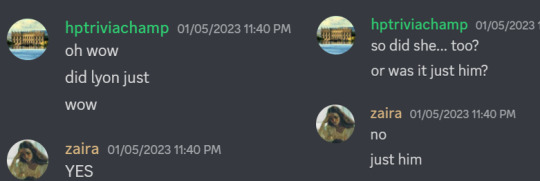
The Counterfeit Scoundrel by Lorraine Heath (Releases on Feb 21st)
For the full (funny) story on how I got an early copy, see here.
This was very much a *thinking* book. Ever since I started writing as certain dark things are to be loved almost two years ago, I've always been on the look out for books that basically show that fight for women's rights neither began nor ended with suffrage. I appreciate this book because it delves into how much more difficult it was for women to be granted a divorce historically, and gives a fictionalized take on the lengths women might be willing to go to in order to get a divorce. Make no mistake, Blackwood and Daisy's relationship is very very romantic, but I think by the time I finished, I felt like the history was the main draw for me.
A Daring Pursuit by Kate Bateman
The classic familial enemies-to-lovers book. Also, it's very rare to see HR set in Wales, which I did appreciate. Anyway, "enemies" Carys (a proper Welsh name, according to Rhys Winterborne) and Tristan decide to have an affair so Carys can see what she's missing out on in the marriage bed. As it turns out, A Lot despite her thinking otherwise because of a bad first time. Obviously this gives our hero a chance to be all "he didn't do this for you??" It's all very fire-and-ice until they find themselves in over their heads with all their Feelings, especially Carys.
There is a very primal sex scene post bear-chase, and if that doesn't compel you to read this book, I don't know what will.
#trivia's book round-up#january 2023#julie anne long#lorraine heath#historical romance#grace callaway#kate bateman#joanna shupe#sarah maclean#bridgerton#book recs
16 notes
·
View notes
Photo
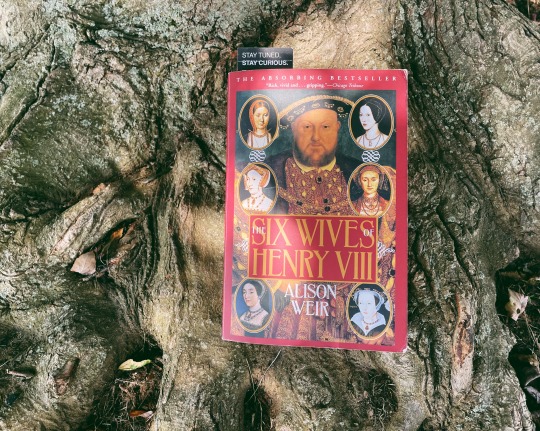
The Six Wives of Henry VIII by Alison Weir is a fantastic work of history writing that dispels a lot of common legends and misconceptions about the famous wives. I decided to read it as I was seeing Six on Broadway with my mother—it was the second time I was seeing the show, and I wanted to dive deeper into the truth of the matter.
It broke a lot of my misconceptions actually, and I found it really enlightening. First came Katherine of Aragon, of course, who I've always loved—what I didn't know is that by the time Henry decided to try and divorce her, they hadn't slept together for many years due to difficulty following one of her pregnancies, and it was clear she could no longer have children. His main motivation was a desperate need for a male heir, because he couldn't risk an uncertain succession on his death, which would certainly cause a civil war. Anne Boleyn was an ambitious, arrogant, and intelligent woman in the right place at the right time, but her bewitching of him was secondary to his growing indignation of needing to answer to the Pope and his need to solidify an heir.
I didn't know that it took a full 7 years for Henry to be able to marry Anne Boleyn, or that she too had several miscarriages. Weir makes it clear that Anne never committed adultery, let alone plotted against the king. Anne was not a witch, not scheming against the king, and not an adulteress, but she was a vindictive woman who enjoyed murdering her enemies and who alienated too many of her allies, and that was ultimately her downfall. Weir’s analysis of the evidence we have and don't have is convincing, and throughout the book I was impressed by the way she conveys research and technical work without it becoming tedious.
I've always read of Jane Seymour as this demure lady, but Weir makes it pretty clear that she was actually extremely calculating, smart, and ambitious herself, and knew exactly what she was doing when she replaced Anne Boleyn and presented herself to the king as quiet, shy, modest. He loved her deeply, and would later be buried beside her. He was devastated after her death.
Weir can't shed too much light on what the king hated so much about Anne of Cleves, and finds it fascinating that Anne was actually beloved of the people. She was perhaps the smartest of his wives, because when he suggested their marriage was invalid, she simply accepted it and agreed to all terms, ensuring his respect and her own survival. She would go on to have a happy and unprecedentedly independent life for a woman of her age, running an efficient household, minding her business, and befriending Henry's daughters.
I feel deeply sorry for Katherine Howard, who was young and silly and arguably quite stupid. It's clear she was thrown into an intrigue she was too empty-headed to handle, and her affairs were extremely indiscreet. Obviously the king was gross, but he really loved Howard and believed her flattery of him, and so he was burned by her foolish betrayal.
And then there's Katherine Parr, who set a new bar for women, making the learned woman fashionable, publishing books and becoming a mentor for young girls in court. She was intelligent and formidable, and when they tried to take her down in Henry's eyes, she gathered her resources and her wit and got herself out of it, something his other wives couldn't accomplish.
All this to say that I learned a lot and have new perceptions of all six wives, and most surprisingly, of Henry VIII. Weir argues well that he wasn't just a lecher jumping from his wife to younger women but a tyrant considering the politics and fear of conspiracy, paranoia, and war, and the problems that would be caused by a weak succession. Still what we'd call a bad man, but not perhaps the stereotype of the never-satisfied, sex-obsessed wife killer that people tend to portray him as. His legacy isn't just his wives and his children, but also the reverberations of the debate and constant court intrigue between reformative Protestant and old-school Catholic politics in England that occurred during his reign.
#henry viii#six on broadway#six the musical#the six wives of henry viii#the tudors#nonfiction books#history books#my book reviews
40 notes
·
View notes
Text
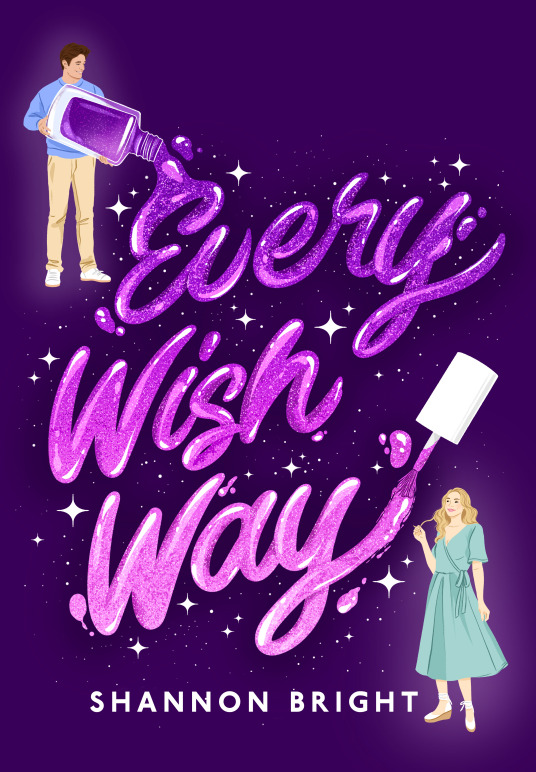
Rating: 1/5
Book Blurb:
Perfect for fans of Erin Sterling and Ann Aguirre, for everyone who’s ever dreamed of finding Mr. Right, and settled for Mr. Right Now, this romantic comedy from debut author Shannon Bright is a sparkling cocktail of humor and heart.
Raised by a mother whose ironclad motto is “men are trash,” Iza longs to prove her wrong, ideally with a kind, steady boyfriend who will free her from the exhausting treadmill that is dating. Although she’s willing to try (almost) anything to find love, accidentally summoning a wish-granting stranger out of thin air was never part of the plan.
Unfortunately, Beckett, her personal wish-granter, isn’t exactly the sage and generous being she would expect. Instead, he loves to party, has attitude to spare, and boasts an uncanny ability to point out Iza’s worst flaws. Iza decides to use one of her three wishes to create her dream man—a modern Mr. Darcy. If that esteemed gentleman can’t impress her overbearing mother, no one can. Using Pride and Prejudice as the handbook to Darcy’s heart, Iza plays the part of Elizabeth Bennet and sets out to create her epic love story.
Making wishes and winning Darcy over becomes more complicated than Iza expects, especially with Beckett’s adorably dimpled grin and unexpected kindness in the equation. Soon enough, she’s glimpsing the truth of the man behind the flippant persona, and each moment in his company makes her question everything she thought she wanted from love.
Review:
What if you suddenly found yourself with a magical genie who can grant you three wishes and the only thing you ever really wanted was to find Mr. Right? Well for Iza, being raised by a mom who thinks all men are trash, finding a guy to meet her mom's standards has been difficult. Iza longs to find Mr. Right but she's had no luck until suddenly one day after opening a bottle of nail polish suddenly a very cute but frat boy genie appears named Beckett, who tells her he is here to grant her three wishes. Iza wants to find Mr. Right and the only Mr. Right she can think of to ask for is a modern day Mr. Darcy, but when she gets her wish granted he is not what she thinks at all... and maybe her Mr. Right has been next her all along wanting to grant her heart's wishes...if only she could pay attention. This one was such a let down for me, I truly wanted to like it so much but Iza constantly got on my nerves. She goes on and on about how she's tried everything when in fact she has not, she went on one dating app and then went on a date with an actual prince who liked her and dipped. She has serious mommy issues and when someone calls her out on it, she immediately says nah. Iza is whiney, judgmental, and for someone who says she wants Mr. Darcy and says her favorite book is Pride and Prejudice but freaks out when Mr. Darcy just acts like Mr. Darcy and has to have her own friend explain it out for her, it's baffling. I loved Beckett, the genie and love interest and honestly wanted him to end up with someone else because the way she treats him the entire book is not it at all. Sadly this did not come off as a cute rom com and missed the mark on growth for Iza. I really just did not vibe with her at all.
*Thanks Netgalley and Alcove Press for sending me an arc in exchange for an honest review*
2 notes
·
View notes
Note
I could dm you about this but I guess this topic deserves to be brought up publicly. Apparently you are the first writer I came across who made a focus on Aemond's chronic pains caused by the trauma (in fact, he's a disabled person and it upsets me how everyone seems to ignore this aspect). Of course, he could be so stressed after facing Rhaenyra but I view it a bit differently and still wanna thank you 🌼
Ciao Anne!, (@wildfieldz)
This is so sweet, thank you!, You're gonna make me blush!
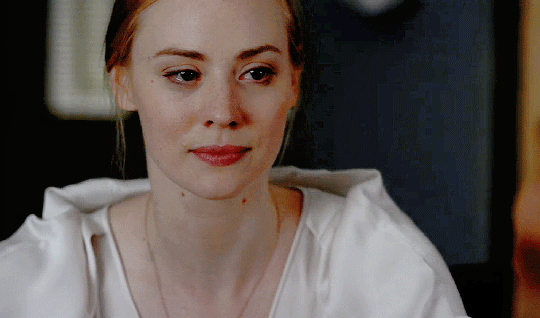
I was talking about this matter with @maddiethefashionista when I was working on the chapter, as she's my support system and helps give me confidence when I need a boost of it.
I don't understand why the show never showed us the consequences of what these people faced not only emotionally but also physically (they failed utterly on both things tbh). The books do, though I still feel like all the rest takes the precedence over the emotional and physical trauma these people endure; which is what happens in real life and what ends up creating even more trauma and problems.
One of the reasons why I love Sansa so much is that she's solid, despite all the trauma (physical and emotional) she endures she still remains true to herself, she still steps up, steps out in the snow field and still she cares for her cousin like she cared for Bran and her siblings, she still let herself be held and never rejects touch, she never rejects emotionally anyone, she offers herself and still wears her heart on her sleeve as a conscious decision and faces the consequences. Bran is the same, he never folds to his own disability — he is Bran the Broken, but he is also the heir to Winterfell and to Robb's crown, the prince of Winterfell and he remembers both in the same breath, that's endurance. That's the kind of resilience people have and I would've liked to see it more in the show as well — but I digress.
Aemond is a disabled person who worked his ass off to be as efficient and proficient as an able-bodied person (despite his missing eye he becomes a great swordsman; he studies and acquires the competence to lead and to understand the world around him despite his young age and remains loyal to his brother) but still a disabled person he is. He adorned his eye to put something beautiful to cover the marring of his eye, but you can't convince me that didn't have consequences (we're always talking of a gem put inside an empty eye-socket) on top of the consequences people who lost their eye suffer through.
It's human of him to suffer from migraines and also Aemond of him to shoulder through them with gritted teeth. You chose to read it exactly how I wrote it.
There's a reason I keep putting emphasis over Sansa's knees bothering her and her joints having become more fragile after what she endured — the rationing and the almost frostbite — and putting emphasis over Aemond's eye bothering him, the phantom pain of it and the migraines that come from it as well.
I'm not a doctor so I don't know if the symptoms I have described are actually ascribable to the pathology (having lost an eye or almost dying of frostbite) but I've tried to put emphasis over the fact that these people are still human, they get worked up and their health acts up not only as a result from the stress but also of the trauma they endured. But I've seen people living with the consequences of their physical traumas other than emotional so I think that's an aspect that gives depth and truthfulness to the story so thank you for remarking on it.
As always sending all my love ~G.
#ask the hag#anon asks#firesteel#kissed by fire ~ kissed by steel#firesteel fandom#firesteel brainrot#firesteel for the win#aemondxsansa#aemond targaryen#aemond/sansa
11 notes
·
View notes
Note
living in the past, it's a new generation - tell me as much as you want to about yourself and I'll make a mood board of what i imagine your past life would be (i'm obsessed with historical fashion, let me indulge myself)
this is so creative oh my goodness how do you come up with these??? also i went a little overboard while talking about myself i hope thats ok<3
i'm an isfj, and i'm fairly shy. i have anxiety, and i get really quiet in social settings- i have 3 close friends who mean the world to me, and i'm part of a really small friend group but i value individual friendships much more because of how intimate they are. i listen to music quite often, read too much (i get caught up in books really easily), listen to a lot of music - taylor swift wrote mirrorball for me - and i'm an academic validation girlie. my aesthetic is somewhere in between coastal granddaughter and coquette- i kind of dress like rory gilmore, i wear flared jeans a lot and floral or lacy tops.
i use she/her pronouns, and i'm straight but mayyybe bi?? i like to think i'm feminine- i love perfume and lavender and candles and claw clips and locket jewelry. i'm 5'2, petite, and i have medium-length hair that's light brown in the winter and strawberry blonde in the summer (idk but something about the sun changes its color, i don't know how). i'm really fair skinned, blush easily, and i have a few freckles- i get sunburned really easily so i try to take really good care of my skin. my teeth aren't very straight but i like to think it's a cute little character flaw haha.
i'm a ballet dancer but i also ice skate for fun, and i play touch football in the spring. i'm also obsessed with pearls. i write a lot as well- mostly poetry, but i don't post it on here lol. i adore pretty trinkets and dresses, iced matchas from starbucks, gracie abrams, romcoms, and pale pink converse. my favorite show is gilmore girls & anne with an e, and my favorite movies are little women (2019) and dead poets society. thank you<33
babe, why do we have the same hair except mine is only red because it's so stained
And also, don't apologize for talking about yourself. This is science, I need DATA!!!! It's also an excuse for me to know you better<3 (this is also gonna be lowkey fantasized because old times be rough and I'm not gonna put your past self through that) We are here for lighthearted gaiety!!!! Nothing more, nothing less!
Anyway, I got carried away and made a pinterest board rather than a mood board, sorry, but anyway, absolutely 100% certainly late victorian ballerina
I kinda feel like its low hanging fruit cus like, you said you love ballet but honestly I was thinking it the whole time, I just got lucky when you confirmed it el oh el
I think you wouldn't be nobility exactly, but like gilded age and whatever, you'd have money so you get a fancy education and excel in all your courses but then you start ballet and you're definitely better than everyone there too. So you eventually become on of the most famous ballerinas and duh everybody wants to be you or be with you but you're like naaahhhh I have enough friends, thank you though. BUT THeN! One day, at some dinner party your obscenely wealthy grandma is having in your honor at her beach mansion house (because you're the bestest ballerina of them all) you meet gaspspps A Devilishly dashing (person of whatever gender you're feelin, I won't tell you what to do) and it's a relentless back and forth of will-they-wont-they and your friends all say yes but you say no because "they're probably just like everyone else, they don't want me for me, they want me for what I do, what I could offer them"
BUT THEN! dun dun dun,,,a totally random accident that happens out of nowhere and is completely unrelated to dance (i'm hella superstitious and if you think i'm putting that out there? Haha no way), leads you to an early retirement because you still love to dance but the fame isn't all you bargained for, so you move to the seaside and DUN DUN DUN! Who comes to visit??? Your beloved suitor!! and then you have a beautiful life filled with perfume bottles, lockets, lavender sprigs, and beach picnics <3
ummmm I got very carried away but i hope you liked it <3
4 notes
·
View notes
Note
Top 5 fictional crushes ✨
This was so hard: I felt exactly like this tiktok
Anyways after much deliberation:
Simon Lewis
James Herondale
Jem Carstairs
Gilbert Blythe
Percy Jackson
Simon Lewis - my favourite character from TMI; I couldn't see why Clary was going for the broody angsty type when Simon was right there! I especially love him in TFTSA when he's not putting up with any of the shadowhunters' bs. So much more I could say but you also love Simon so I'm sure you already know why.
James Herondale - I love this boy so much. He's so polite and shy especially when he was younger; bookish and so loyal; it was so nice seeing him come out of his shell a bit and be confident and comfortable with the people he loves. Also!!! the people he loves he loves them with everything he is; he's also just so charming but without being cocky? Also very cute; I 100% see why Cordelia likes him so much
Jem Carstairs - I feel like at this point you can probably recognise a pattern in terms of my type lol. Jem is the sweetest human being alive and gentle and kind and so strong. He chooses to be kind and a good person everyday, despite all the horrors and suffering he has faced and the cruel hand he has been dealt. Even the small bit I've said does not fully encompass who he is as a person and fully capture why I love him so much
Gilbert Blythe - this man!! Honestly I love the romance between him and Anne so much; especially over the course of the first three books. He's hardworking, he tries so hard to be Anne's friend and just is so earnest in his efforts? He sees Anne exactly how she is and loves every single part of her - that quote in Anne of Avonlea where it says if Gilbert had been asked to describe his perfect girl, it would have been Anne, right down to the freckles on her nose that she hated so much? *screams* that is the kinda romance I want; also the way when Anne rejects him and he respects that and takes that step back to create that distance between them that he needs cos all those little things had meant so much to him and he needs space to just be her friend.... this man, just I love how respectful he is while also being able to acknowledge what is best for him. He never punishes Anne for not being able to give him more than friendship and respects her decision and does continue to be friendly; but also respects his own boundaries and knows how to put himself first. Gilbert was never cruel; I also just love their friendship and how close they were in Anne of Avonlea especially. He also pushes Anne to do her best and sends Anne the lilies of the valley when she graduates, the necklace as well at Christmas(?), letting Anne know there's no hard feelings and still showing her love and caring in a way that honours the years long friendship they've always had. Going to stop now cos otherwise I will never stop but yes Gil is just the perfect gentleman and I adore him.
Percy Jackson - this one especially I was like I love Percy - in what way ???? Percy Jackson is a character I have so much love for and his relationship with Annabeth is my absolute favourite thing to read about. I started reading Percy Jackson when I was 12 and then flew through pjo and hoo in like a year or so, so I went from being the same age as him to younger and then slowly over the years with TOA etc eventually becoming older than him. It's been a weird experience. I have so much love in my heart for Percy Jackson and I will always be so happy that I picked up these books all that time ago
#jules💖#simon lewis#simon lovelace#james herondale#jem carstairs#james carstairs#gilbert blythe#percy jackson#tmi#the shadowhunter chronicles#tsc#shadowhunters#tlh#tid#tftsa#the mortal instruments#the last hours#the infernal devices#tales from the shadowhunter academy#anne of green gables#aogg#anne of avonlea#anne of the island#anne shirley#shirbert#pjo
16 notes
·
View notes